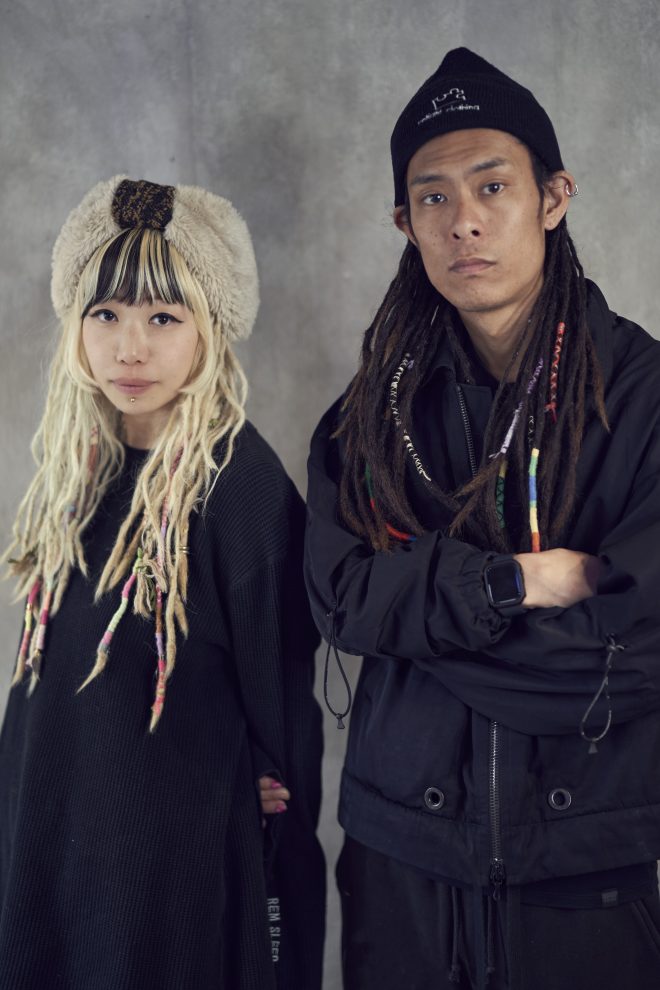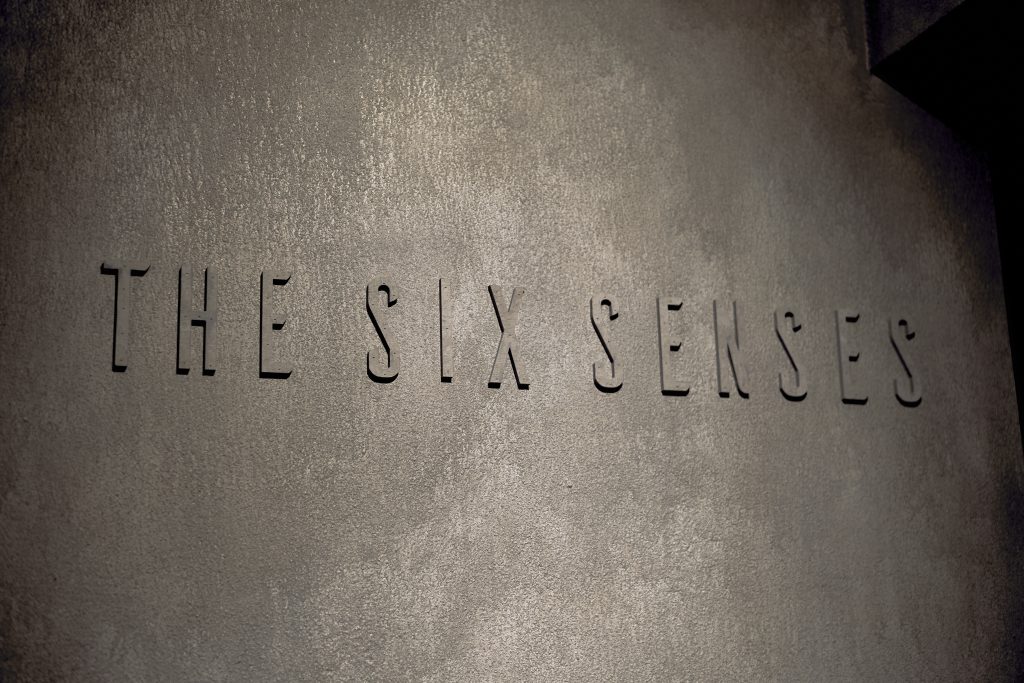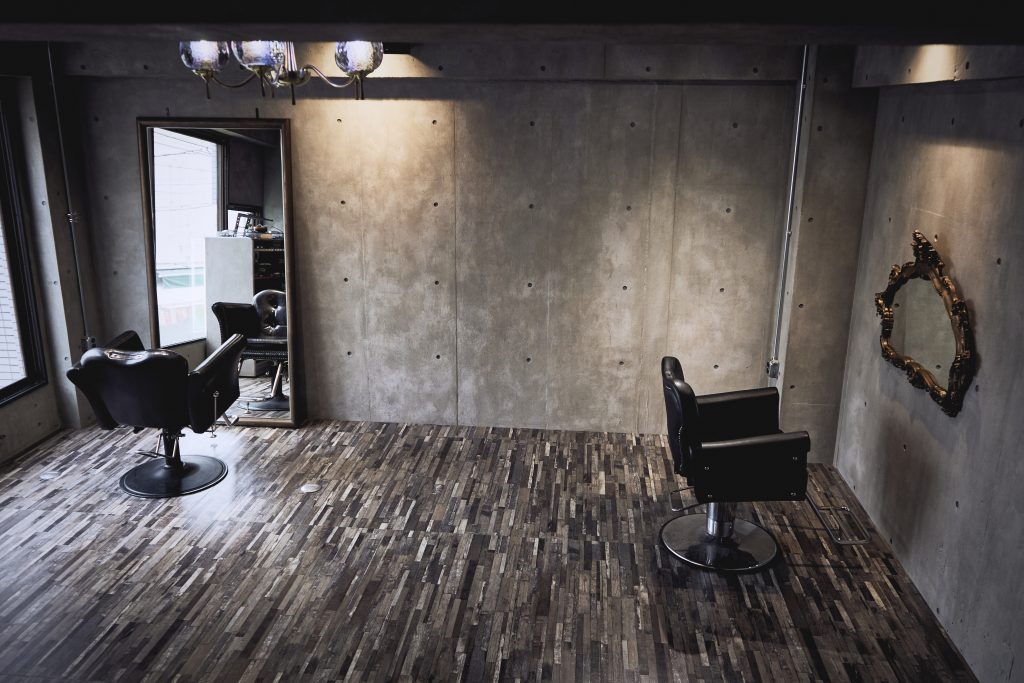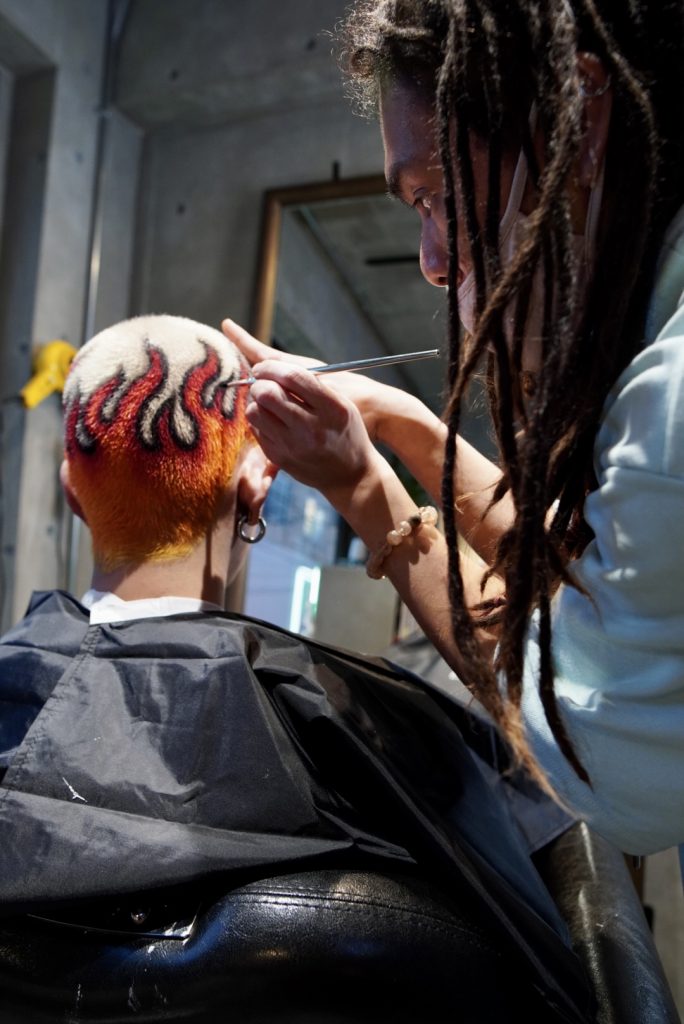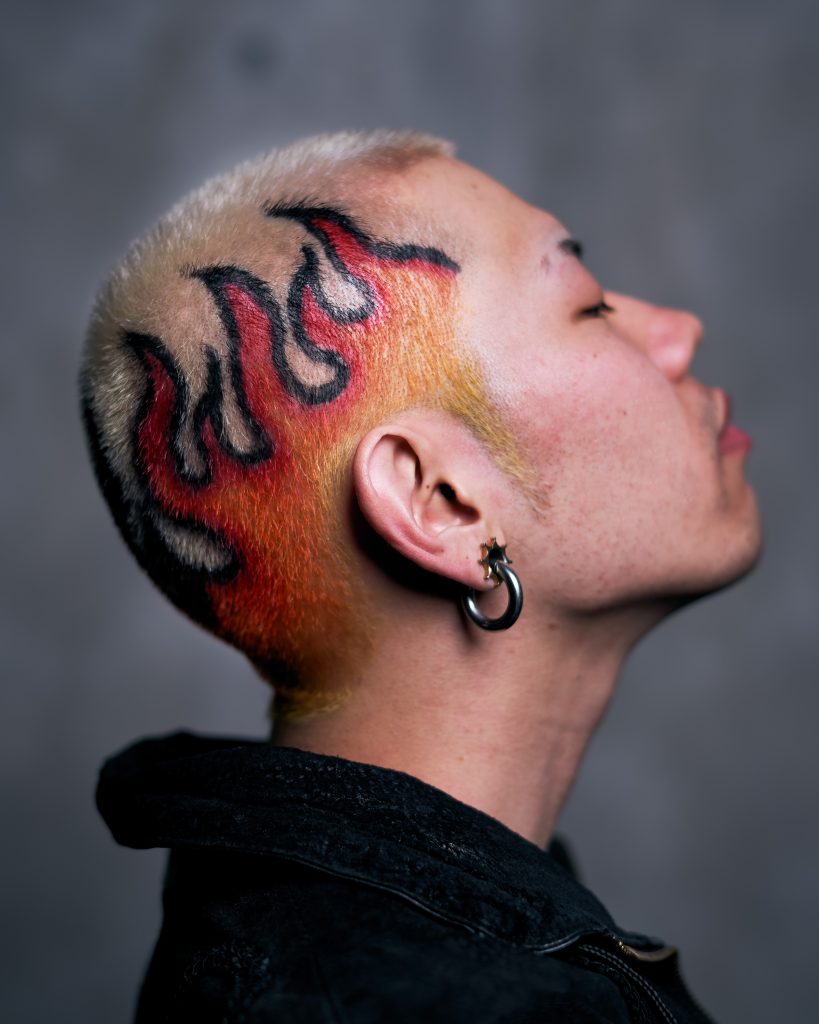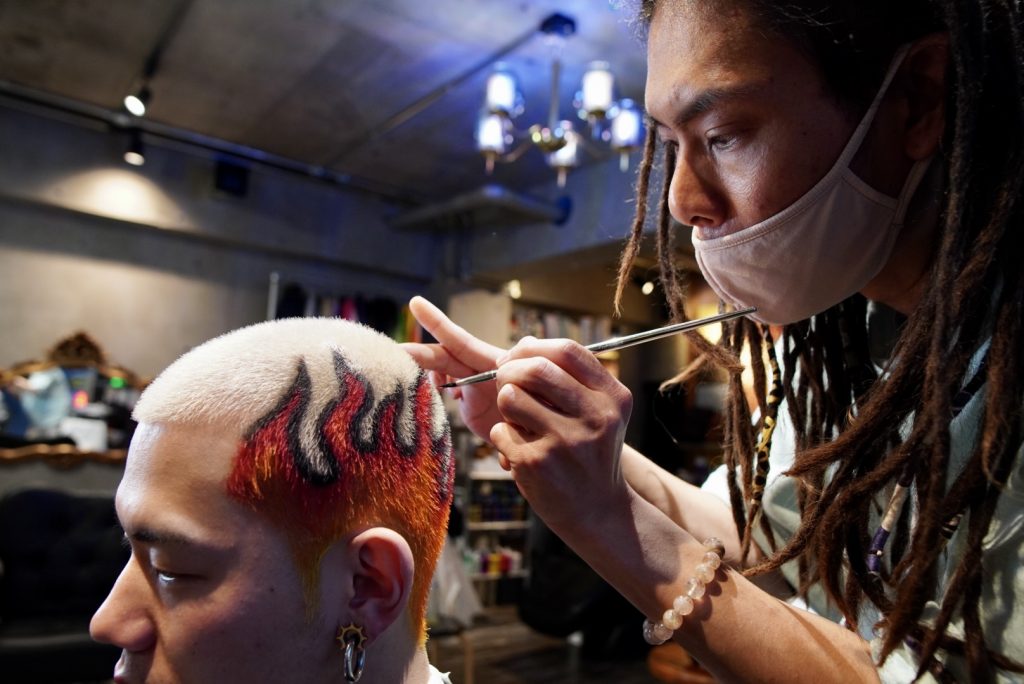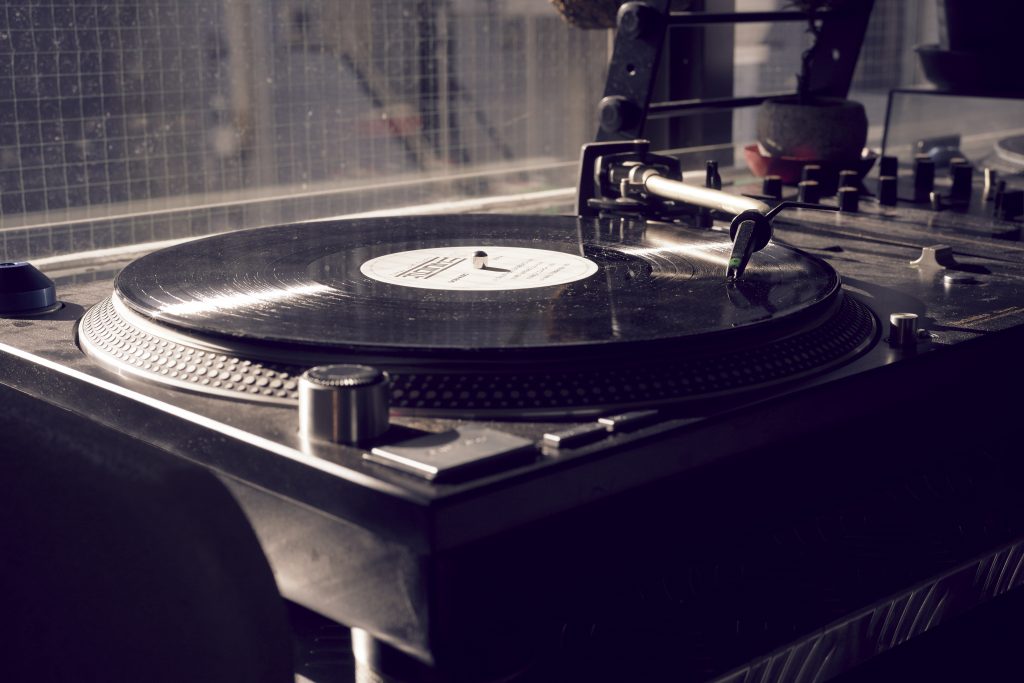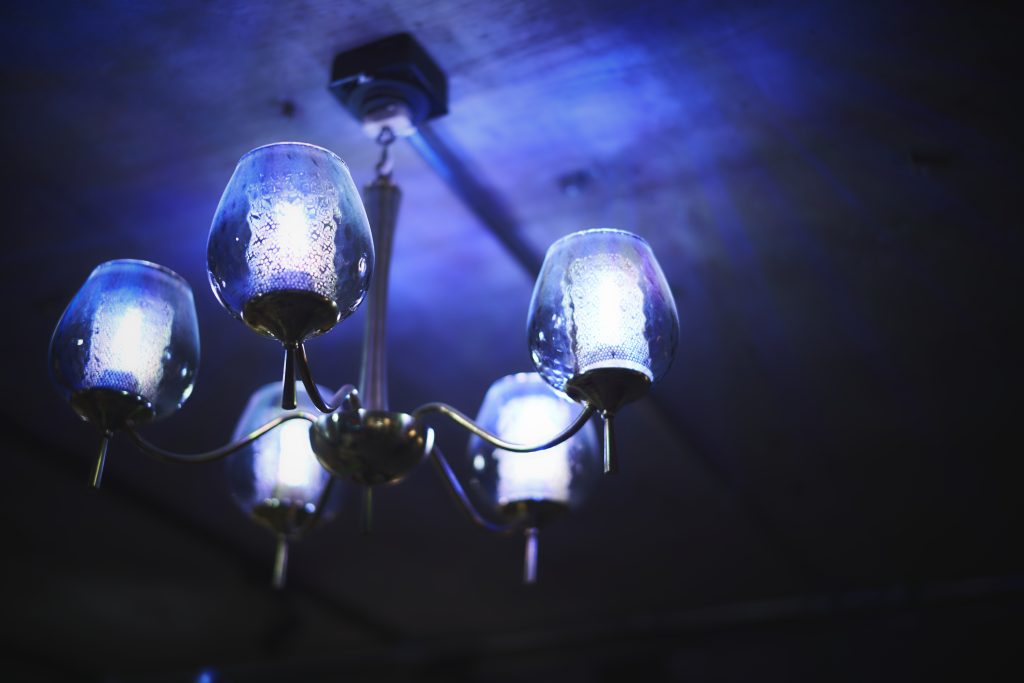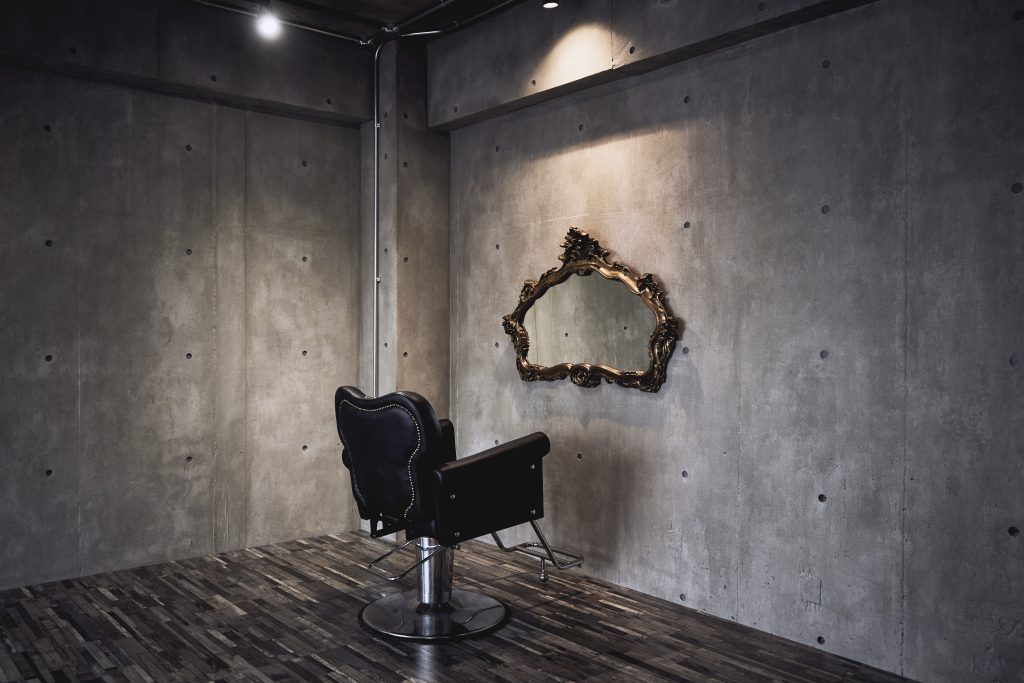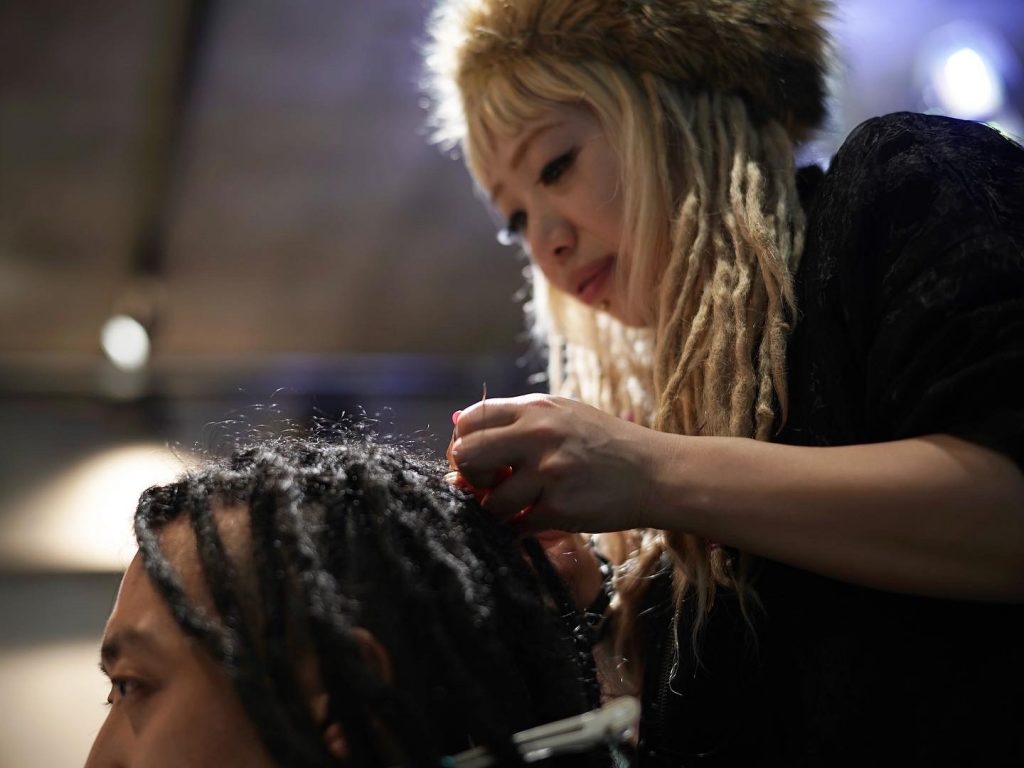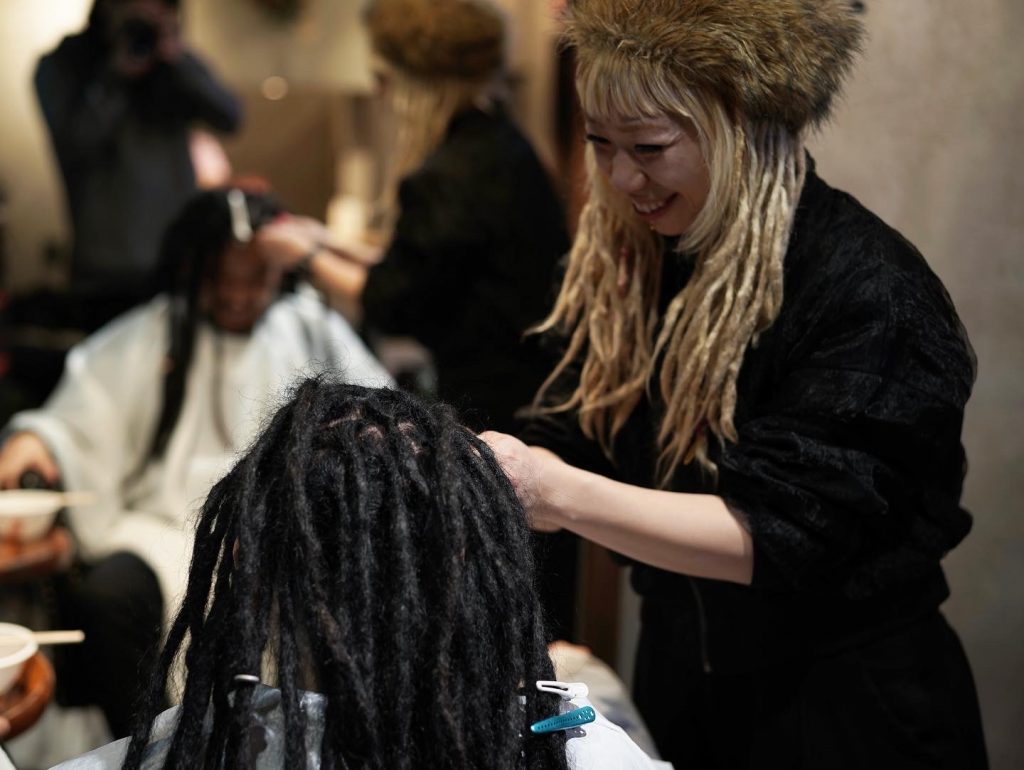"THE SIX SENSES", a Tokyo-based salon where artistry and innovation collide. Here, founders RYOSUKE and YUKKE have built a haven for creatives while looking to push the boundaries of hair styling. In this interview, we had the pleasure to learn more about the two young visionaries: from their early beginnings, to the challenges they've faced and how to overcome them. Get ready for an inside look at the journey of "THE SIX SENSES"!
Thank you for joining me for this interview today. Would you please share a little bit about yourself for the readers, who don’t know you yet?
RYOSUKE: I'm RYOSUKE and I currently own and work in a hair salon. I attended Le Toa college in Osaka. After which I joined the salon "PEEK-A-BOO" in Tokyo as a new graduate. I wanted to utilize the experience I gained and techniques I learnt at "PEEK-A-BOO" and apply them as my own base as a hairdresser. After gaining 9 years worth of experience there, I moved back and forth between Japan and the U.S (L.A) for about 2 years.
YUKKE: I’m YUKKE. I attended Vert Rouge College of Beauty, in Osaka as well and worked at a specialised hair salon called "Uchû Kaihatsu Biyô Sho" (translation: Space Development Beauty Salon) in Amerikamura, Namba, for about five years before moving to Tokyo to become independent.
After moving to Tokyo, I worked freelance for about three years. Then, I worked alone in Shimokitazawa for a while before I got where I am now (laughs).
ー Now you are working freely and creatively in your own salon, "THE SIX SENSES", but can you tell us what your childhood dreams were or what you thought your future would be like?
RYOSUKE: I've wanted to be a hairstylist ever since I can remember. Originally, my ideal life plan would have been to go abroad at my current age, but I went once and gained a lot of experience, and now I am an independent hair stylist in Tokyo, so I am very happy about that. In the future I want to expand my activities so that I can go abroad again!
YUKKE: I didn't originally have any dreams or ambitions to be a hairstylist (laughs). But I've liked unique hair styles since I was a teenager. I used to style my hair in a lot of unique ways, so when I was thinking about what I wanted to do in the future, my parents said to me, "Why don't you become a hairdresser?". That's when I decided to go to beauty school and started my life as a hairdresser. Until then, I hadn't thought about becoming a hairdresser at all.
RYOSUKE: We really are the polar opposite of each other! (laughs)
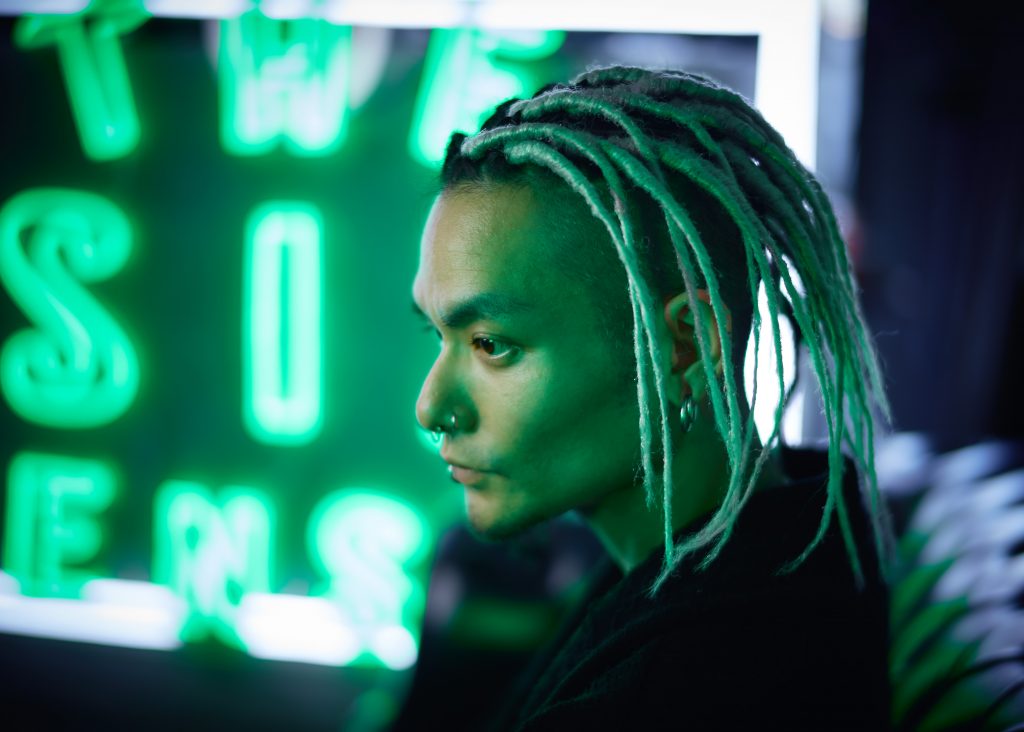
ー But now you two are in the exact same place (laughs). RYOSUKE, you said you've wanted to be a hairdresser as early as you can remember, were there any specific motivations that led to that?
RYOSUKE: I never had a "I want to be like this person!" kind of aspiration, but for some reason, ever since I can remember, I wanted to cut hair. My hometown was a small town on the edge of Osaka, so when I was a child I only knew the world of that town and imagined myself as a hairdresser in my hometown rather than going out into the world. In primary school I used to pretend to cut and style my friends' hair. One day during my primary school days, I dreamt that I was an adult hairdresser and I was opening a beauty salon in my hometown and I was cutting my friends' and customers' hair for free and they said, "No, I can’t let you do that, I'll pay for it!" and I get paid to do business with them. It was such an odd dream, but for some reason I honestly thought it would be nice to be able to live like that, and I wanted to work cutting people's hair, which was more of a child thing than a kick-start, but it [the dream] was an event that confirmed it. So, at first I didn't want to do something that creative, but I liked making friends and connecting with people, and I think that's what I simply wanted to do.
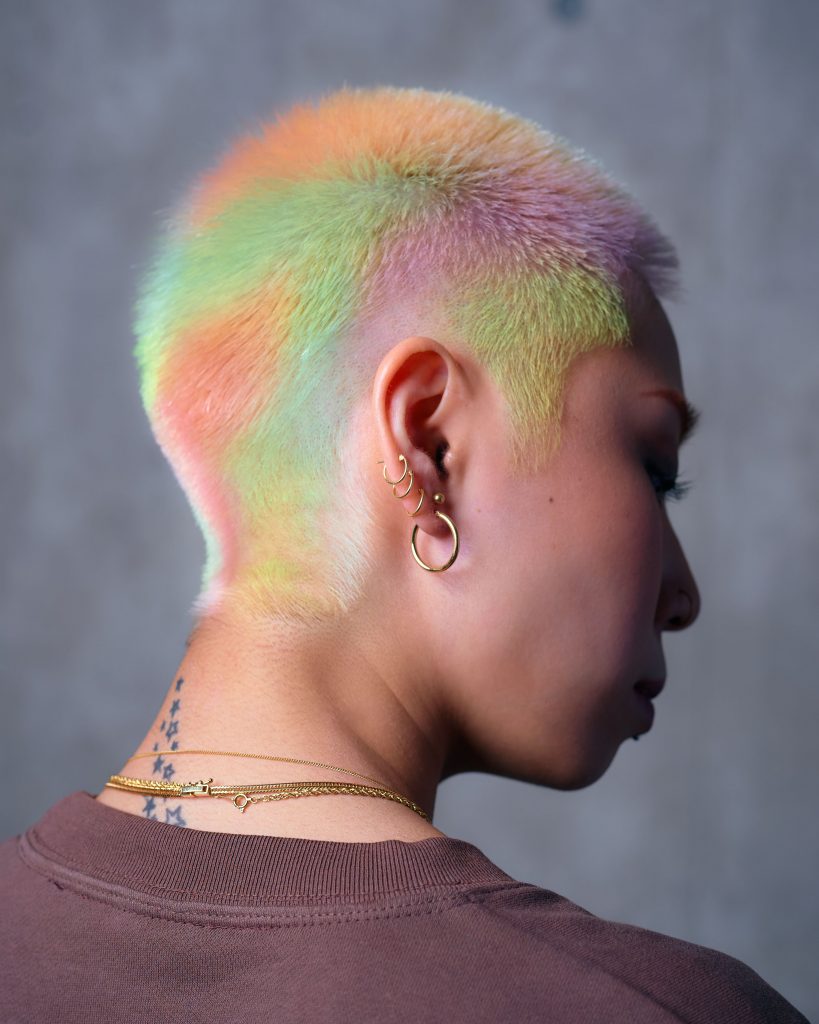 work by RYOSUKE
work by RYOSUKE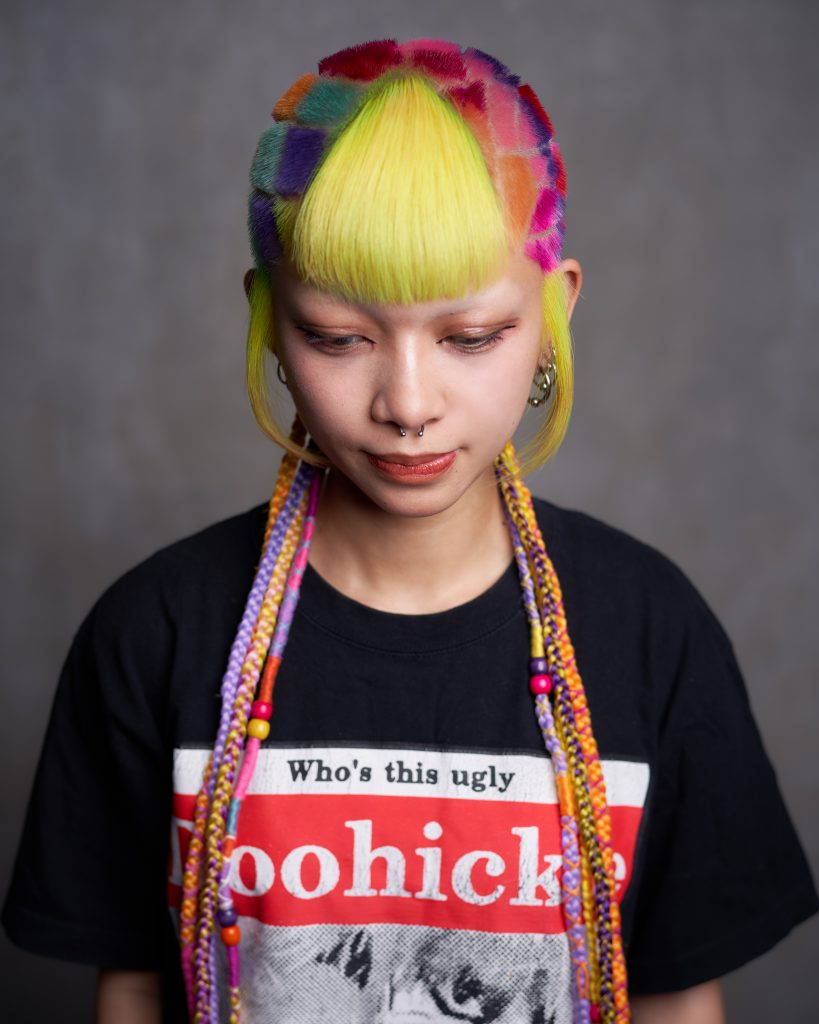 work by RYOSUKE
work by RYOSUKE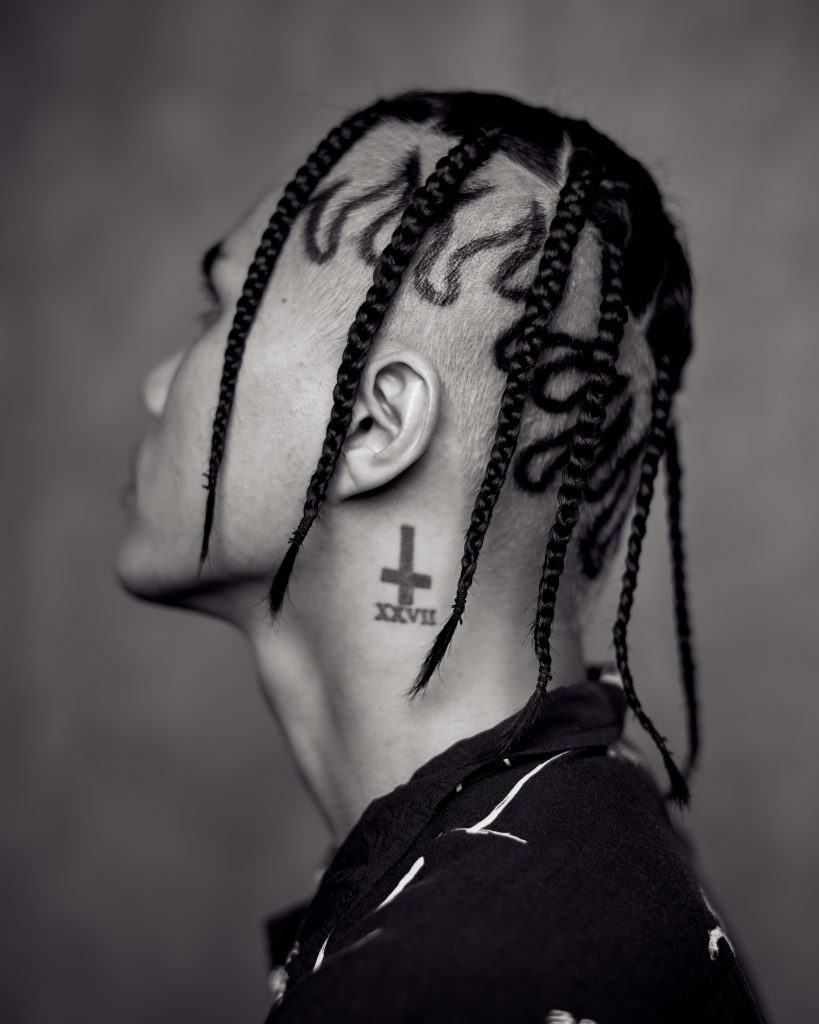 work by RYOSUKE
work by RYOSUKE
ー 「THE SIX SENSES」を立ち上げたキッカケについて教えていただけますでしょうか。
RYOSUKE: I was freelancing for a little while after returning from abroad. At the time, I was renting a place, and renting a place meant that I couldn't shoot when I wanted to, and I had to get permission from someone to do anything before I could do anything, so the process was slow... I wanted to create an environment where I could shoot whenever I wanted to and that feeling just so happened to coincide with COVID making so many properties open and available. But about all, meeting this person (YUKKE) was probably the biggest factor for me, and I felt that it would be more exciting if we combined our two styles here while doing creative and cutting-edge work, which is why I was able to make the decision to do it.
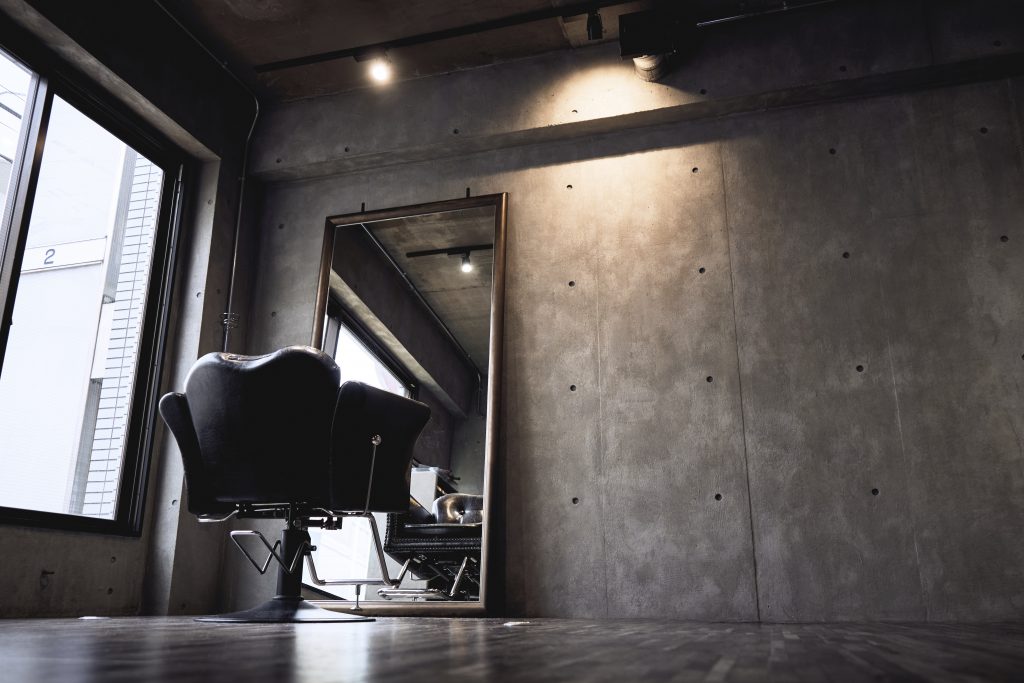
ー Perfect timing!
RYOSUKE:Yeah, it was perfect timing. Due to that encounter, and the fact that there were a lot of properties available with COVID, I wanted to work with a new approach. I had the feeling in my gut that I could do more fun things here even if I didn't go abroad!
ー You wanted to do things in a creative and freer style, right?
RYOSUKE:Yeah, I like my freedom (laughs).
ー As you mentioned earlier, RYOSUKE you have salon experience in the US and Japan, were there any differences when it comes to customers and the working environment?
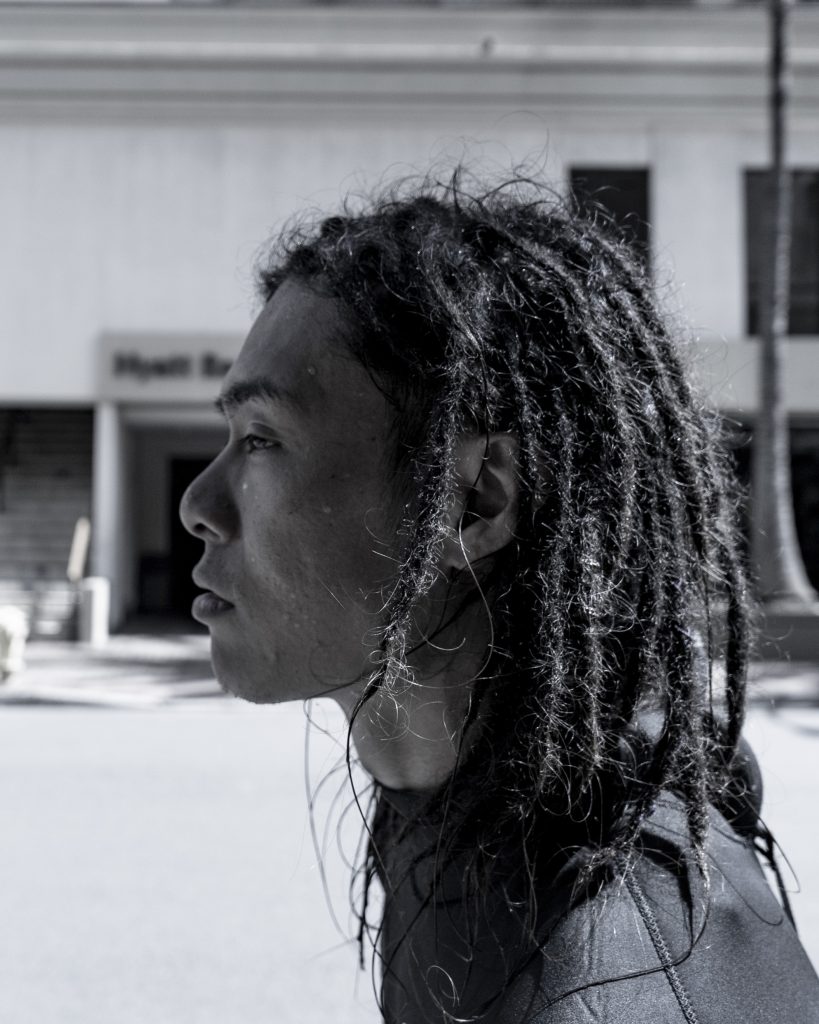
RYOSUKE:There were many differences. The beauty salons I worked at in Japan had a very typical Japanese work style. I dont mean that in a in a bad way. I always felt like I was working as part of a team. However my American mentor preferred more of an independent working style, which initially was a culture shock for me. With this independent working style I really felt a huge difference in the way in which we could do international photoshoots and seminars. Also, Japanese clients tend to make a lot of request like "I want you do this". But overseas the clients would often ask me "What do you think?". Which is probably why, as a hairstylist, I found that aspect of working overseas more enjoyable, I think.
ー Did you find it difficult (when abroad), suddenly being asked what you had in mind, as opposed to in Japan?
RYOSUKE:I used to be the type of person who liked to be left to my own devices, so I actually liked it, but it was difficult when I couldn't convey the nuances of what I thought in English. But now we have images and apps, so I managed to communicate well and get my ideas across. The customer would then say, "Like this. I'll leave the rest of the details to you" and most of them left it to me. It was a lot of fun. And now that I'm back in Japan and doing a slightly more specialised job, I can work in Japan with the same approach as when I was overseas, so I think that's good (laughs).
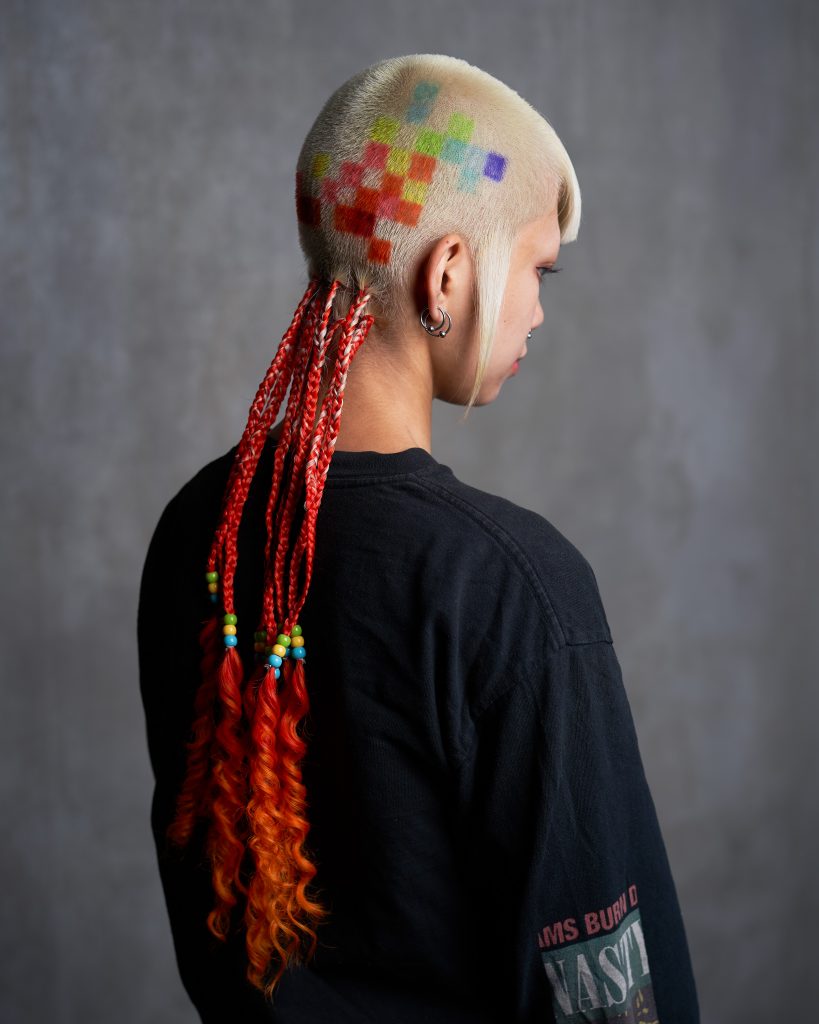
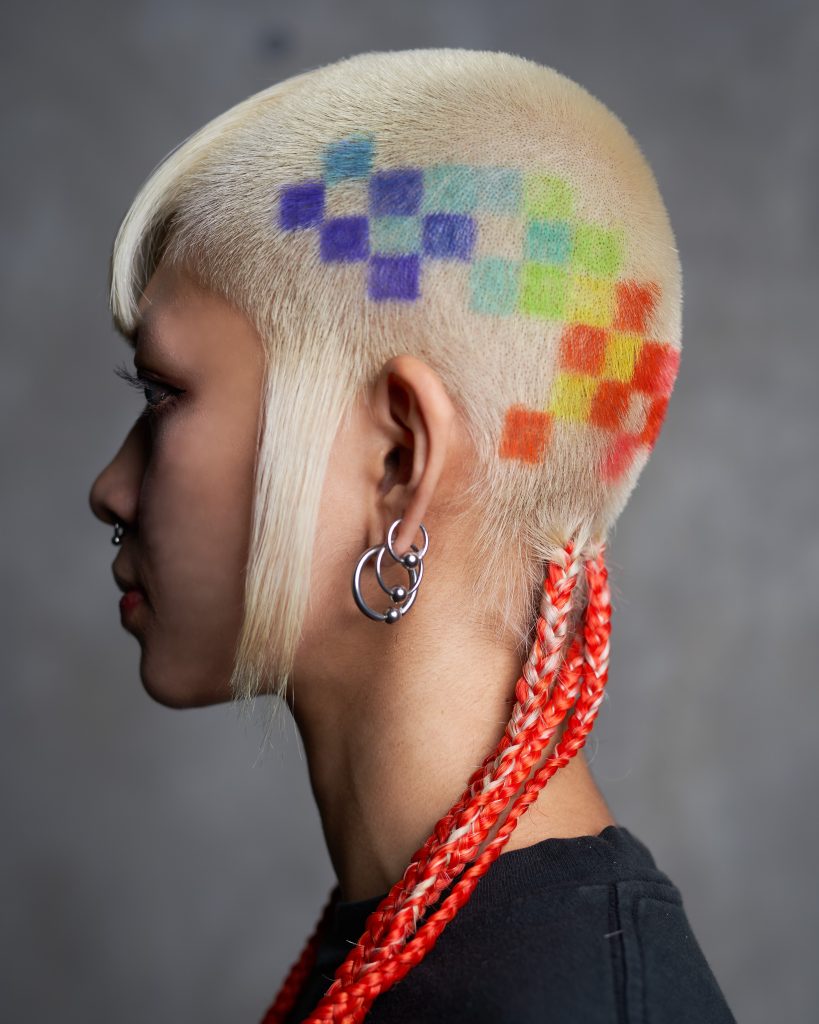
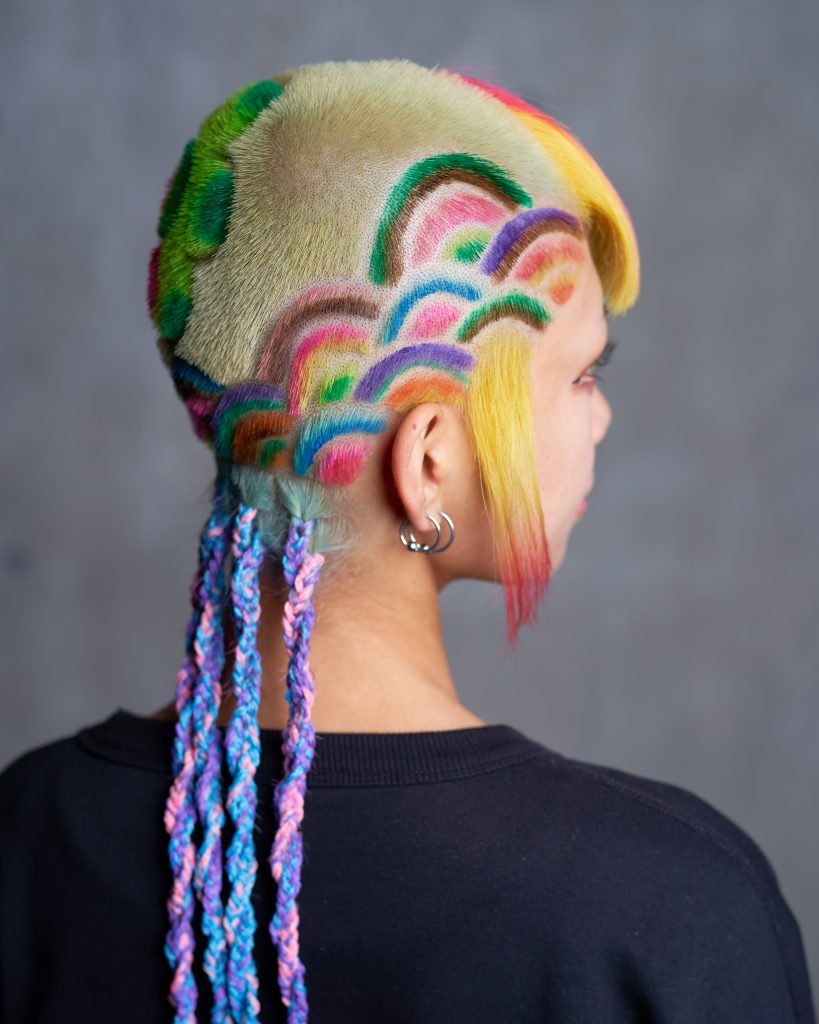 work by RYOSUKE
work by RYOSUKE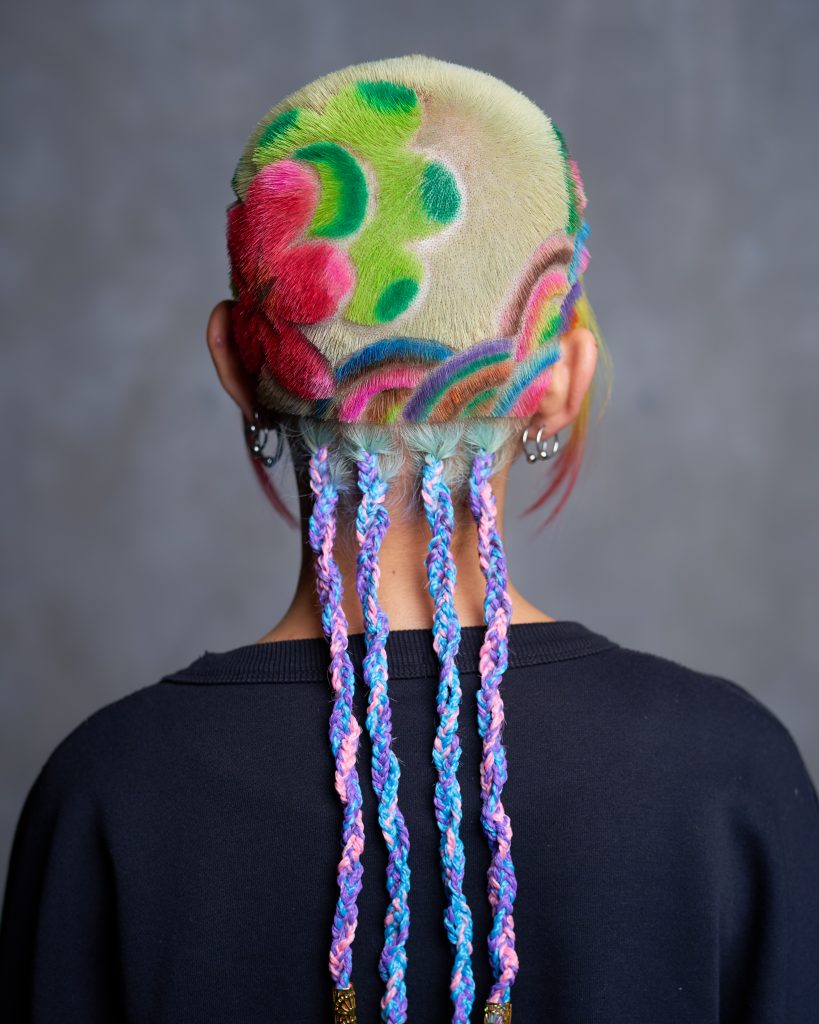
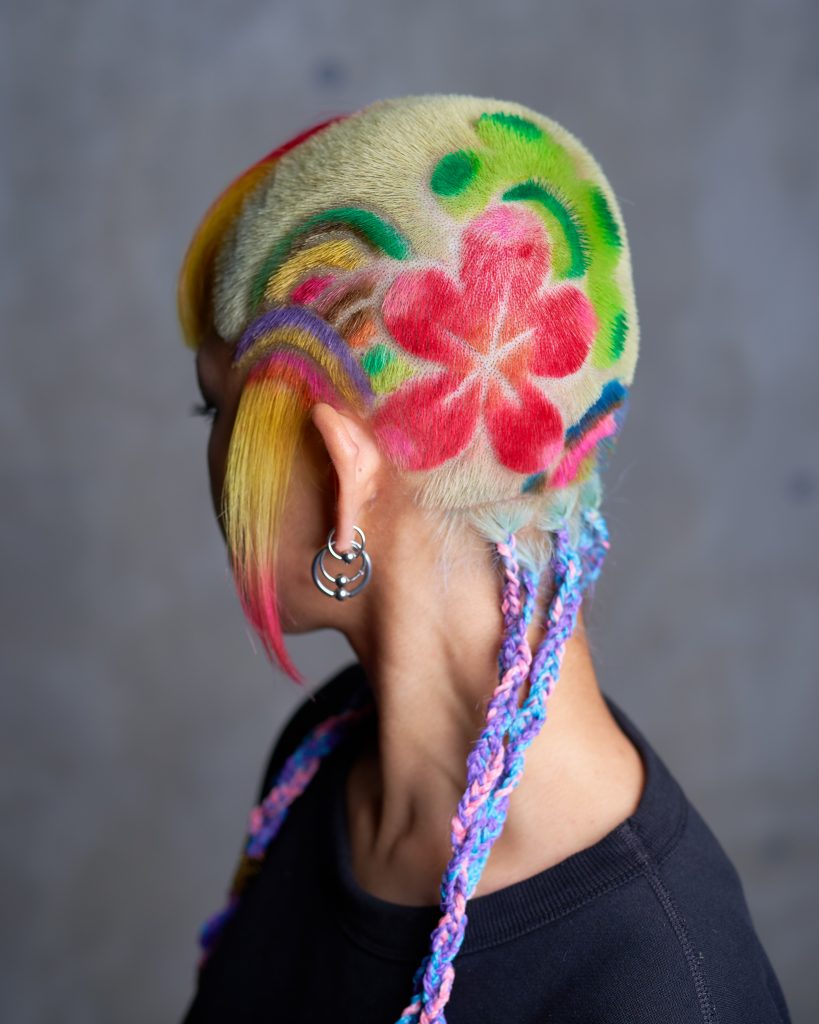
ー YUKKE, when you were 29 you opened your own private salon "PSYCHOLOGICAL". Could you tell us a little more about your time there?
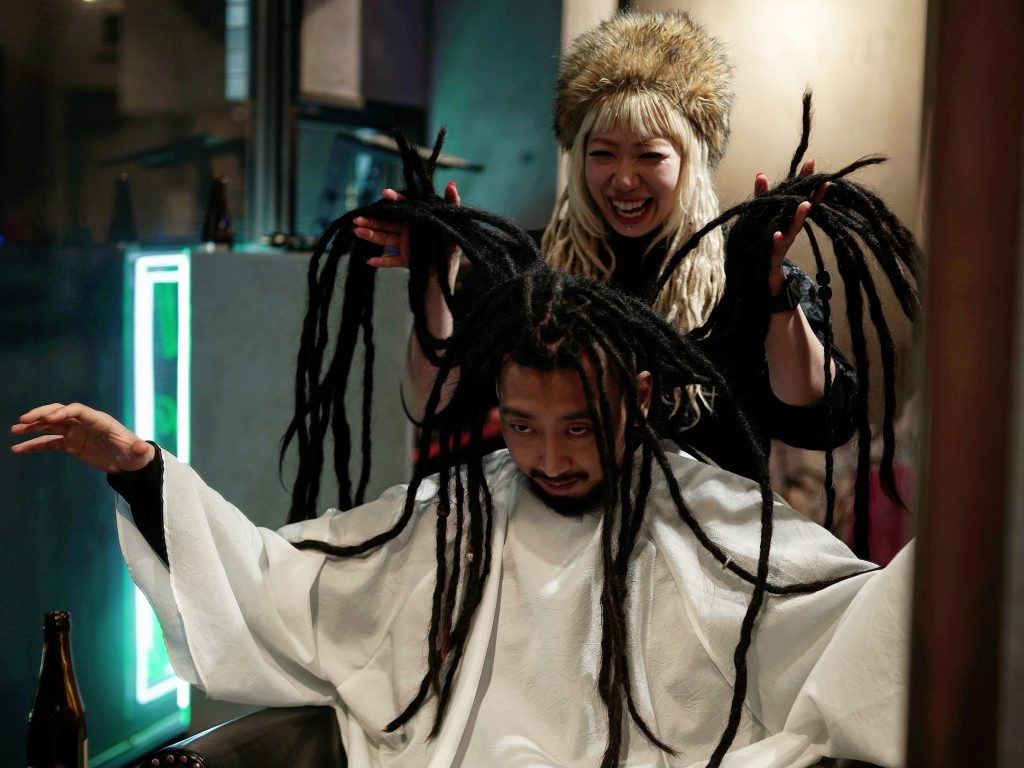
YUKKE: When I came to Tokyo, the shop I was freelancing at wasn't a specialised shop, so it was quite hard for me to be there. Because it was completely different from the style I wanted to do. It was a shop that did regular hairstyles, so there weren't that many customers who wanted unusual hairstyles. So I started in a small property for the time being to focus on unique hairstyles. But at first the only people who came really were just through acquaintances or referrals. From there, I worked hard on INSTAGRAM and was able to draw in more customers (laughs). At the time, INSTAGRAM was starting to become popular, and I think it was the perfect time for me to do it.
ー "THE SIX SENSES" is a salon that also offers quite unique hairstyles such as dreads and braids, was that a priority from the start?
YUKKE: Yes, it was. Even when I was working alone, I was mainly doing specialised work. But there were still people who wanted regular colouring, then I gradually narrowed down to what I wanted to do, and now most of my work is focused on those specialised styles.
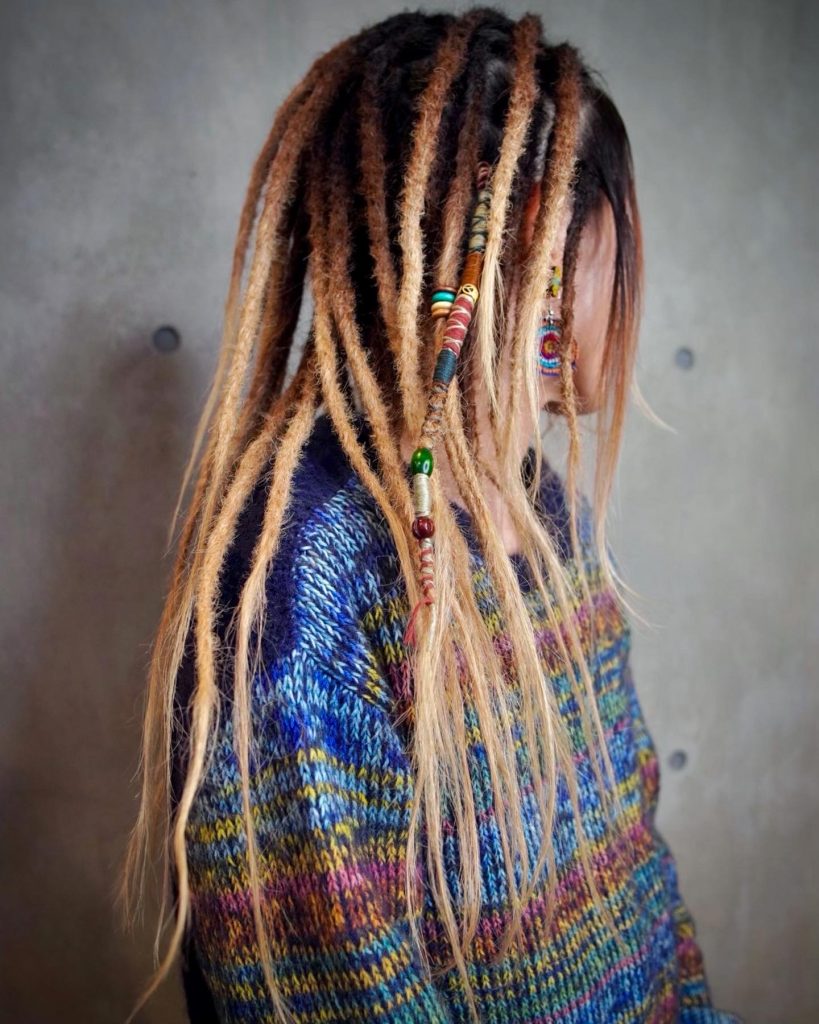 work by YUKKE
work by YUKKE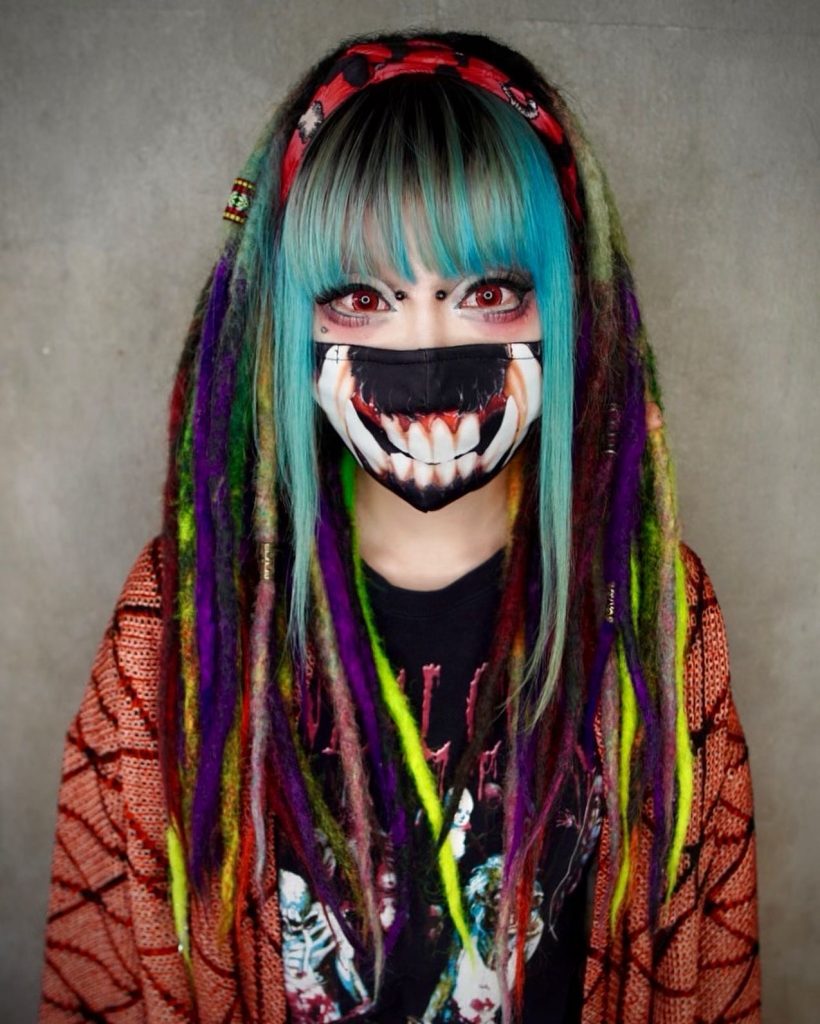 work by YUKKE
work by YUKKE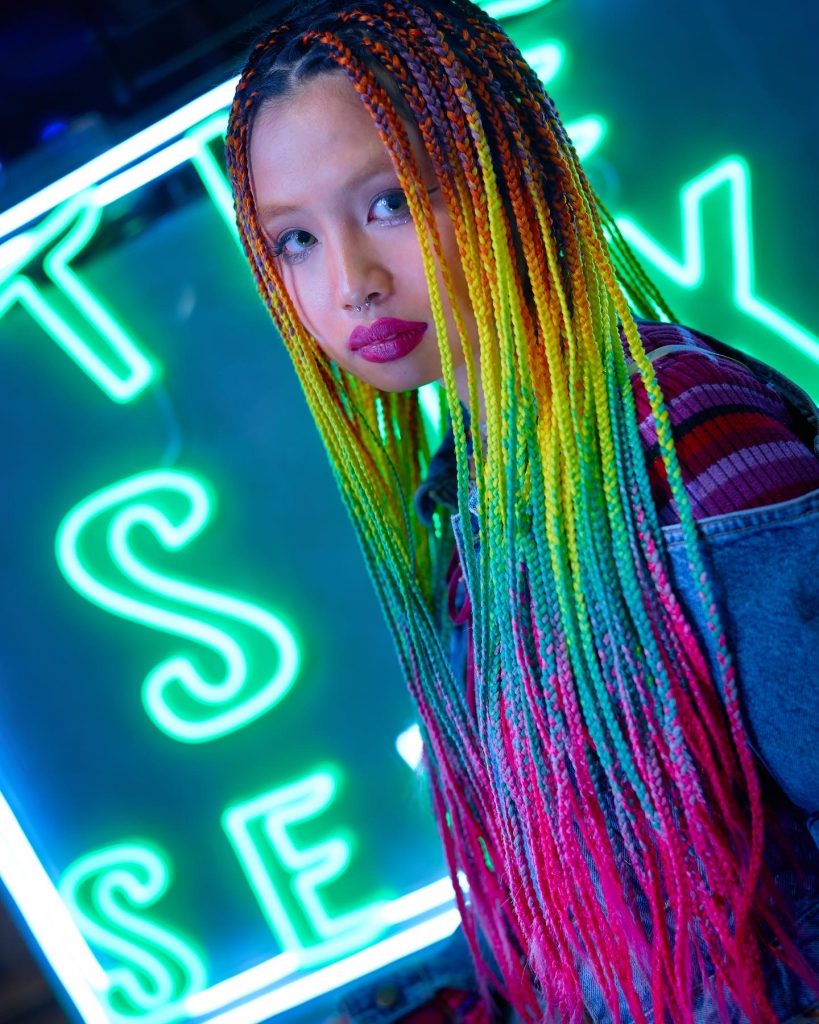 work by YUKKE
work by YUKKE
I wanted to create a space where creators and artists could meet
RYOSUKE
ー And when you started the salon, were there any other aspects you were particular about, other than unique styles?
RYOSUKE: The first thing I wanted to do was to create a space where creators and artists could gather. For example, I wanted to create an environment where background music could be played on vinyl records, where full-scale photography could be done immediately, and where there would be a DJ booth for small parties (laughs). We also only have two seats, so we can tend to our customers properly on a one-to-one basis.
ー Something you couldn't do in the past!
RYOSUKE:It's like we've put together all the things I couldn't do in the past (laughs).
YUKKE:Indeed (laughs).
RYOSUKE:The first thing I wanted was for creatives to get together. I think we are gradually releasing this idea, as we are getting interesting people to come to visit us like this time (with this interview).
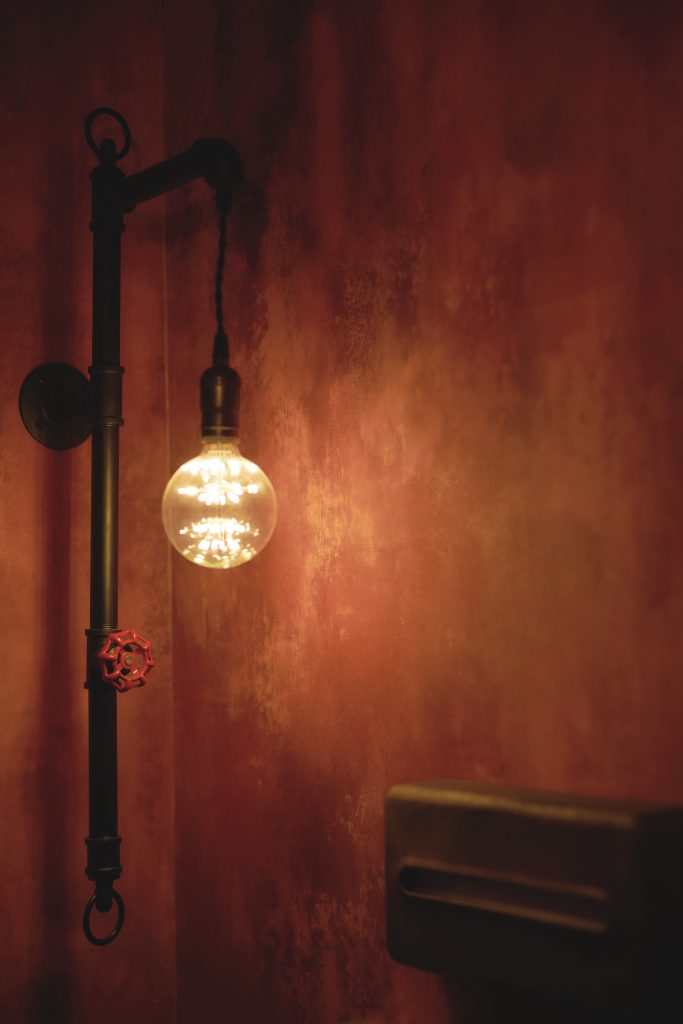
YUKKE: Or doing photo exhibitions.
ー 「THE SIX SENSES」はミュージシャンやアーティスト、様々な印象的なお客様が多いと思いますが、一番印象的な出会いについて教えていただけますか?
RYOSUKE:We have impressive encounters with all of our customers. However, KOIE of CROSSFAITH was originally a high school classmate of mine in Osaka. Later I worked at a salon in Tokyo, and I think that during that time he was in a band in Tokyo as well. We both moved to Tokyo in our early twenties, but we didn't have any contact with each other back then. When I went to America, he sent me a message saying something like "Man, you're doing great!" and I found out that he had made it big with his band. When I was freelancing after returning to Japan, he asked me to do his hair, and that's when we met again for the first time in a long time. When we were in high school, we were still wearing uniforms and neither of us had much connection to the other, but now we've both had a lot of experiences at home and abroad, so I think it's an interesting reunion.
ー That’s such a coincidence!
RYOSUKE:CROSSFAITH have been active overseas and returned to Japan as a kind of reimportation, and KOIE inspires me a lot when we meet at the salon and get talking.
ー 凄く仲良くできそうな関係ですね。ちなみに、もし世界中のアーティストや著名人の中で、是非お客様としてサロンに来店していただきたいのはどなたですか。
RYOSUKE: He's now retired, but Rodman! Dennis Rodman, the basketball player. He is a flashy guy with a shaved head and very colourful dyes, and every game he changed his hairstyle, his hair, and everyone looked forward to that. I'd love to do Rodman's hair (laughs).
YUKKE: That's difficult (laughs), choosing anyone worldwide...I’ve never thought about it.
RYOSUKE: What about GREEN DAY?
YUKKE: Yeah, I like GREEN DAY.
RYOSUKE: But they don’t have dreads (laughs).
YUKKE: Many people around me like KORN and people with that type of dreads style are the most popular around me, so I guess KORN. I would like to work with artists like that. The world's top band members (laughs).
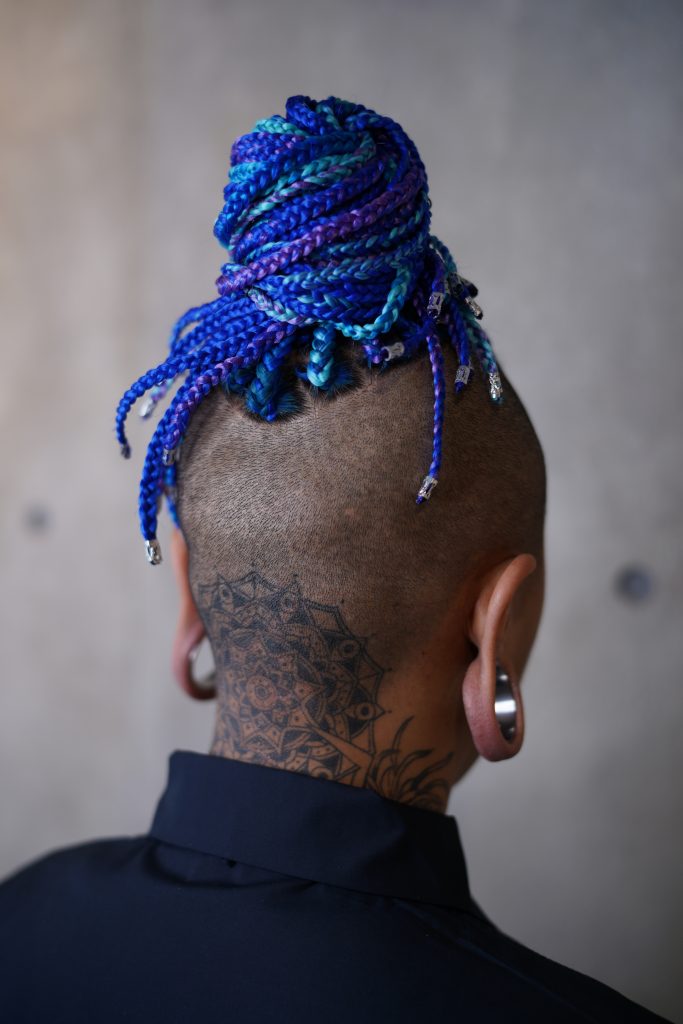
ー I'm going to change the subject, but it seems quite rare for a couple to work together…
RYOSUKE: It is rare, I think.
ー How was it for you? Did your impression of each other or your values change?
RYOSUKE: It has changed.
YUKKE: What? But I haven't changed at all (laughs).
RYOSUKE: Yeah, she probably hasn't changed.
YUKKE:(笑)
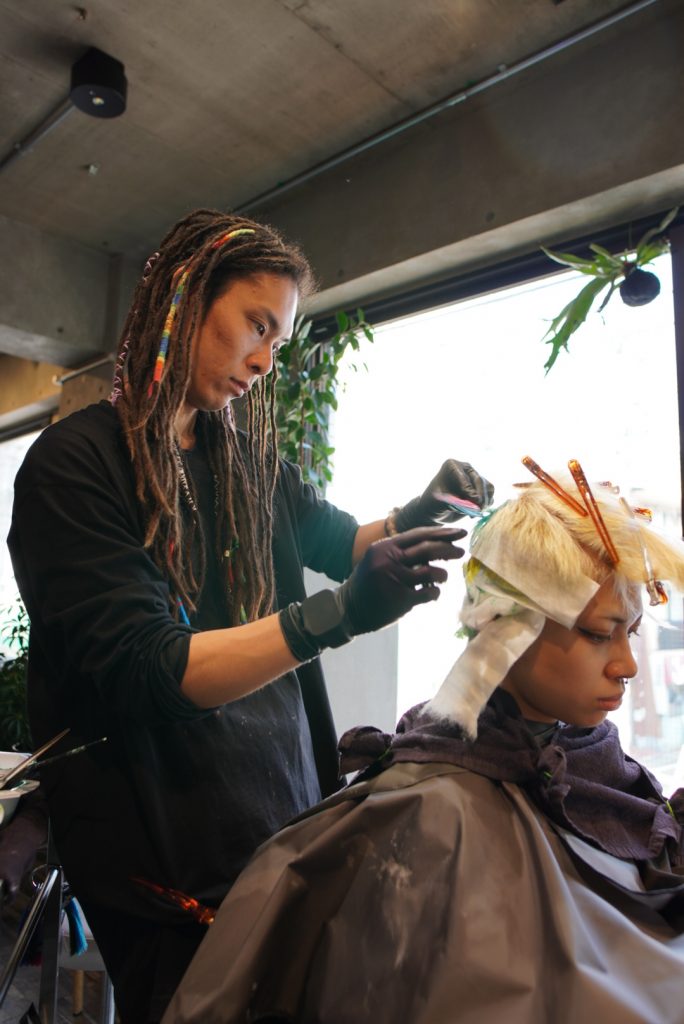
RYOSUKE: I was trained in a rather strict place when I was in my twenties, and I worked in a very Japanese way, but of course going abroad I gradually became more and more open to different ideas. YUKKE is the same age as me, but I was surprised at first because she has a very free approach, which is completely different from my own! For example, if she wants to go home, she does... (laughs)
YUKKE:Hahaha, when I want to rest, I rest!
RYOSUKE:But on the other hand, there are times when she does dreads from 10am to 12pm, so I think it is great [that she is like that]. I had a very Japanese way of working, so I had to decide what time and day to work, but I realised that this pace was not always right. If we had been doing the same kind of work together, there might have been some competition, fights and problems. But we don't assist each other because our jobs are different and we do different things, so maybe that's the key to making it work! We basically don't communicate during work, so that might be another trick to get along well.
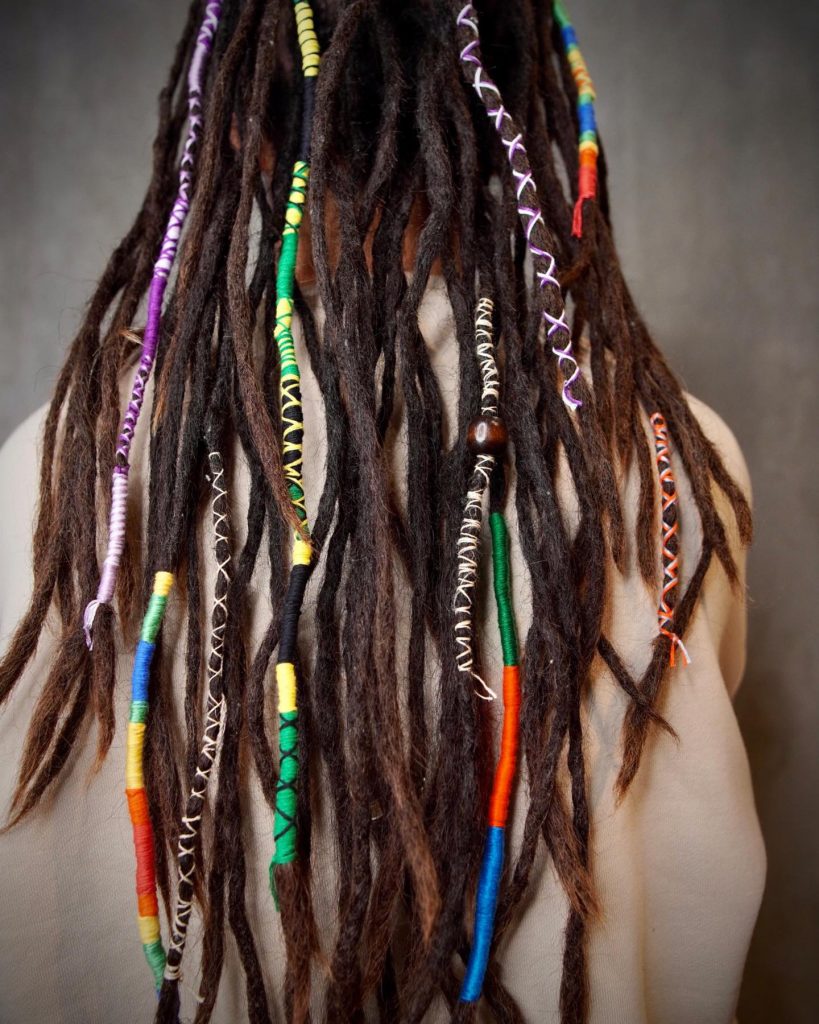
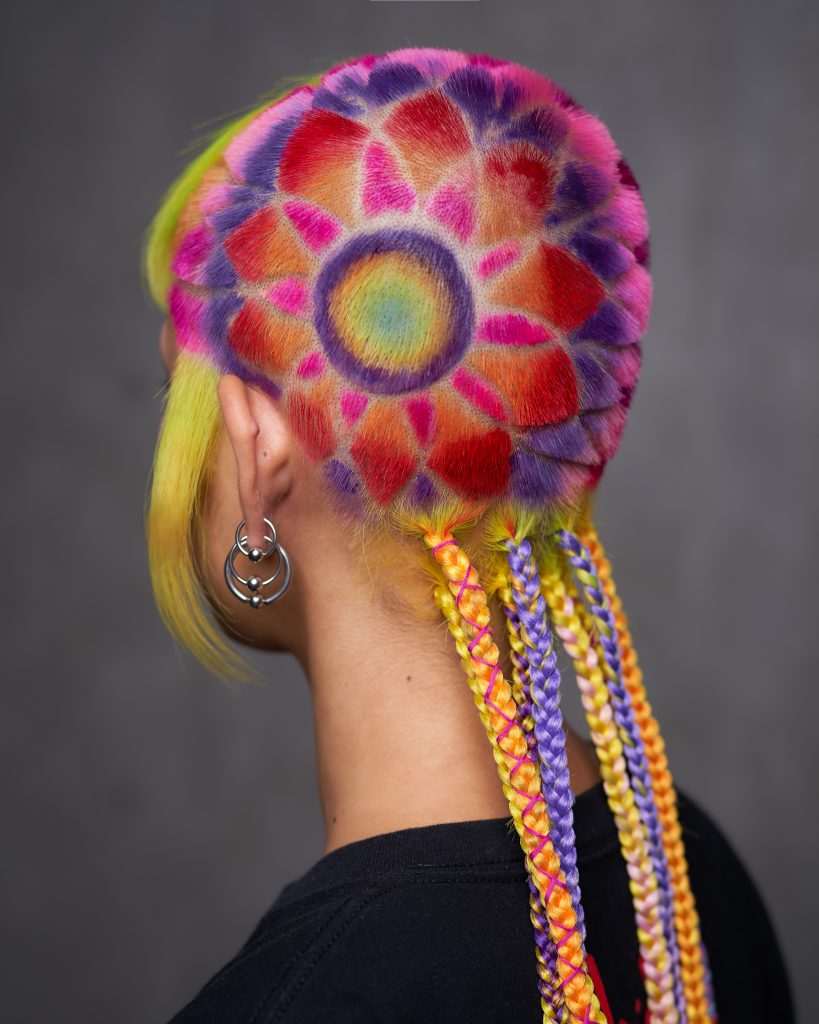
ー What about YUKKE? Has your impression of RYOSUKE changed after working with him?
YUKKE: I don't think it changed... (laughs) He is completely the way I thought he would be.
RYOSUKE: I think I'm a very straightforward person (laughs).
ー If you had to start your entire career all over again from the beginning, is there anything you would change? Something you wished you've done or something you are regretting?
RYOSUKE: I have no regrets, but if I had it to do over again, I would have gone abroad first and challenged myself in many countries from the start. I wanted to go to Europe, and I also wanted to go to Jamaica (laughs).
ー But you can still go there!
RYOSUKE: I guess I could. After building a solid base here, I plan to go abroad to take on many challenges so I’m working towards that.
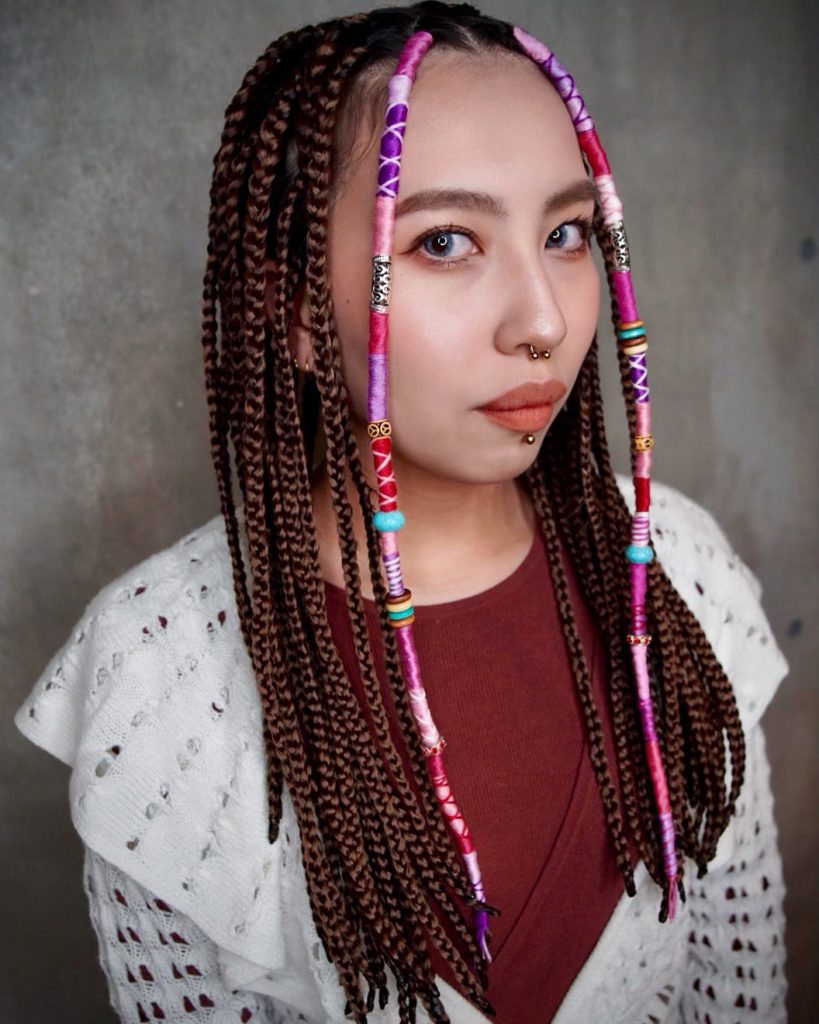 work by YUKKE
work by YUKKE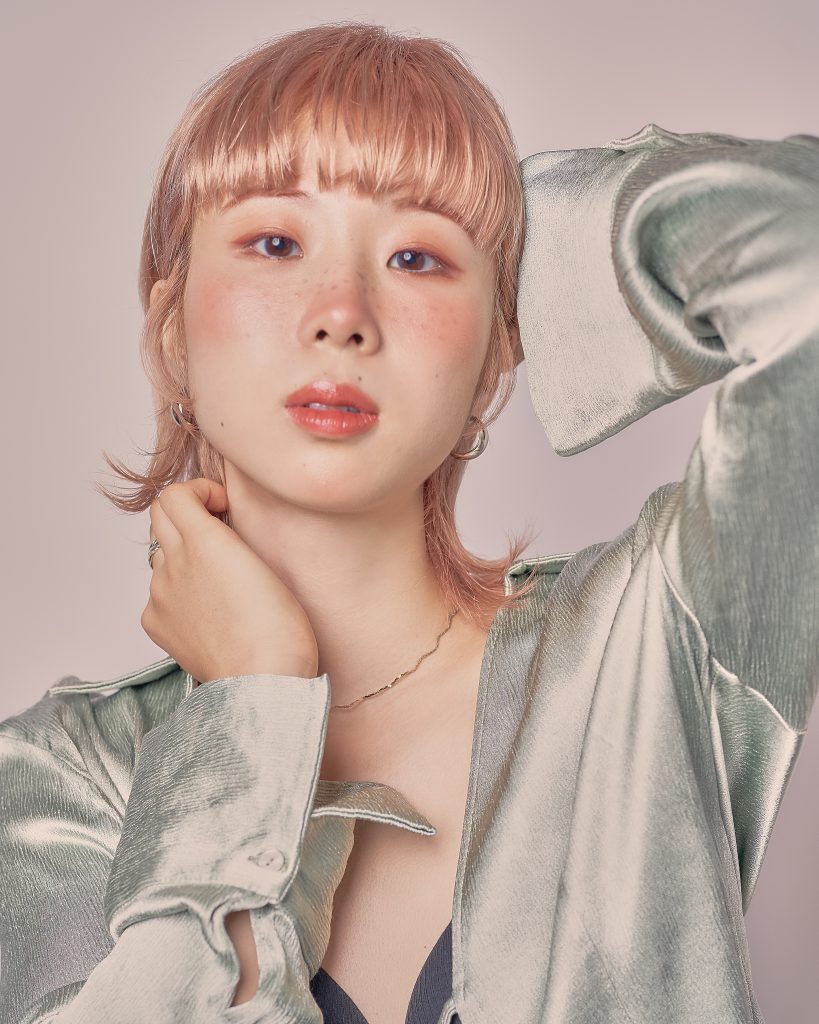 work by RYOSUKE
work by RYOSUKE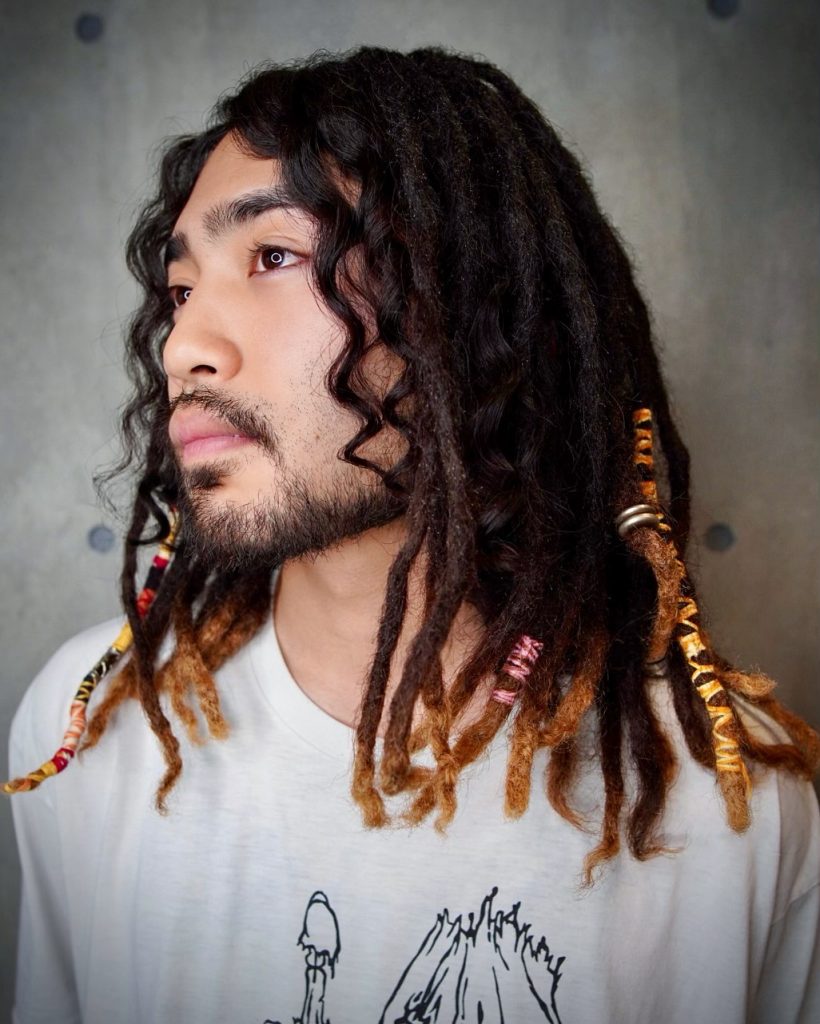 work by YUKKE
work by YUKKE
ー How about you, YUKKE?
YUKKE: If I could change anything, it would be my three years as a freelancer. I didn't have many friends after I came to Tokyo, so I worked as a hairdresser, but it was a time when I was doing a lot of work that wasn't really my style, so I would like to skip that part (laughs). During the three years I worked independently, there were a few specialty salons in the Kanto region, so I was always looking for my own style amongst them, and I think that if I had been able to communicate my own style earlier, things might be a little different now. But I have no regrets about what I have done.
ー If you look back to your creative journey and career, when would you say you struggled the most and how did you overcome it?
RYOSUKE: The hardest thing for me was that I used to be left-handed, but at the first salon I worked at, I was only allowed to use my right hand. The reason for this was that it would be difficult for students to learn when the teacher was left-handed when giving seminars. I had been using my left hand for everything up until then, so I started using my right hand for chopsticks and writing. At the first salon I worked at, my peers were all winners of contests, so competing with that alone was already a challenge, but I also had to use my right hand, so the first two years were really tough.
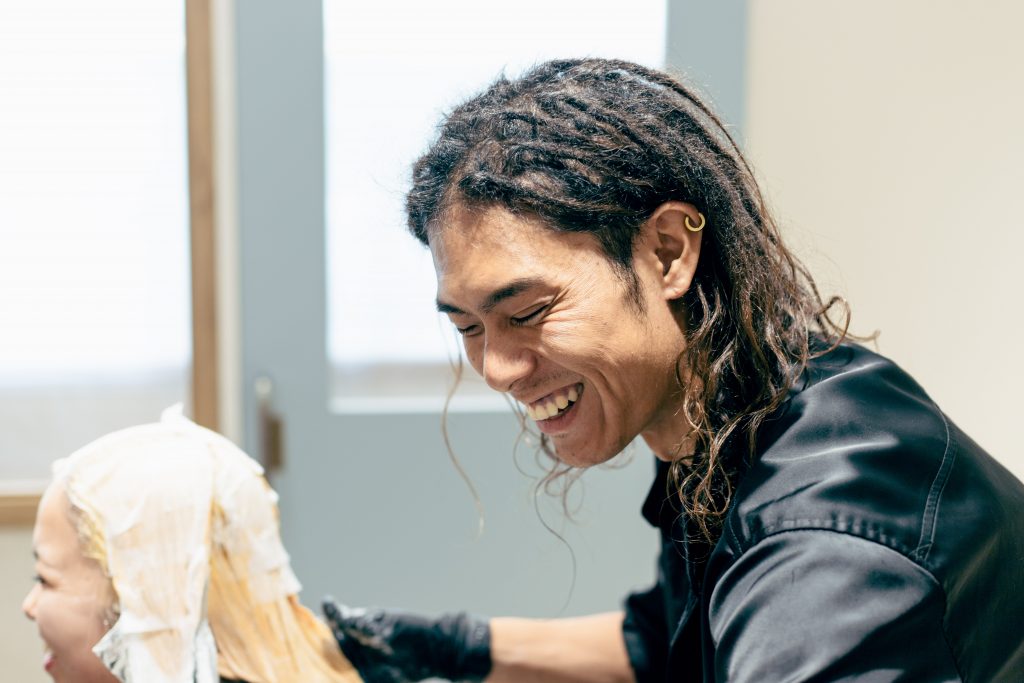
ー That must have been very difficult for you! Did you know in advance that you'll need to change your dominant hand?
RYOSUKE:If I looked it up, I’d probably know, but I only found out about it when I got in.
ー This is the first time I have heard of such a thing! Is it the same outside of Japan? It seems unlikely...
RYOSUKE: Seems unlikely...
YUKKE: That's because it was a salon where they give seminars and teach. I'm also left-handed, but it wasn't that kind of place, so I was totally fine using the left.
RYOSUKE: Yes, I was also told it's okay to be a lefty at vocational school.
ー How about now?
RYOSUKE: I'm still using my right. Slightly off topic, but when you move everything you originally did on the left to the right, the right starts from zero. I was able to learn exactly what I was taught without any weird habits, which is a very good thing now. With this one (left), I had a lot of my own senses (habits). So in that sense, the right one became a very useful hand. I am ambidextrous, so I have very strong hands. I also feel that when I use my right hand, I use the left side of my brain, which I have not used so much in the past, so my theoretical thinking got activated. Now I use my left hand for everything except work, like when I eat, and I try to use both hands in a balanced way. It was tough, though (laughs).
ー YUKKE, can you tell us about your most difficult times?
YUKKE: Obviously, I had a hard time when I was an assistant. Also, since I moved to Tokyo and started out on my own, I didn't have a customer base that I could’ve brought from a former workplace, so it was a difficult time for me to think about how I could get customers and how I could use social networks to survive. If you are employed at a salon, they already have an established number of customers or even patrons, but in your own shop, everything is your own, so in the first year after becoming independent, figuring out how to make a living was the thing I most thought about.
ー At this point in your career, do you still lose confidence or feel discouraged? If so, how do you deal with those feelings?
RYOSUKE: Even now, I sometimes feel lost in many ways! At times like that, I always think, no matter what kind of work it is, everyone probably feels the same. I think that the ultimate goal is to have a big dream that you really want to achieve. When I changed my dominant hand to my right, or when I went abroad and had to return home because I couldn't get a visa, if you have a big goal, the road may change, but the goal remains the same.
ー And what was that goal?
RYOSUKE: The goal is that one day, when I become world famous, I can go to developing nations around the world and organise charity events. If it's just charity, I can do it now, but if someone as famous as Rihanna, for example, does the same thing, I think it would have a different impact on society and the people involved will be different, so I want to do that when I become that kind of person. That's my goal. My dream is that one day, even if it's just one of the people who did the charity work, they will want to work with me. That's what I thought when I was at vocational school. I still keep this goal in my mind as something I want to do someday, and I want to keep working hard to get there.
ー What about you, YUKKE? Do you ever lose confidence?
YUKKE:I don't lose confidence anymore (laughs). In the past, there might have been times when I was unsure of myself, but now, since becoming "THE SIXTH SENSES", I've been able to work in my particular style I want to do, and the customers have come along with it, so I don't lose confidence now.
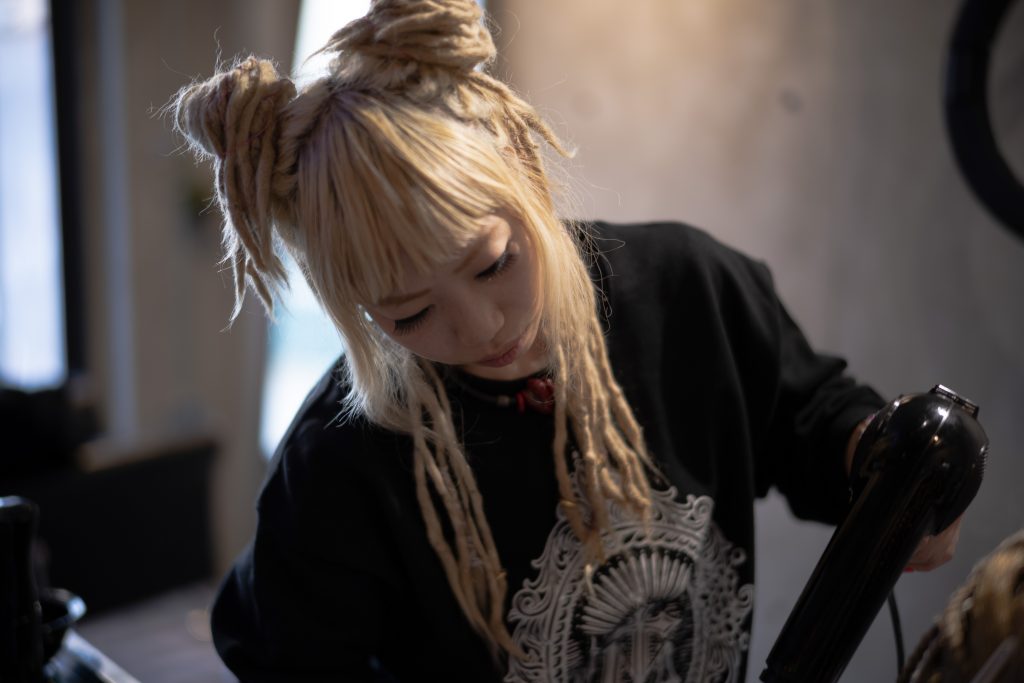
RYOSUKE: She's pretty funny (laughs).
ー I like the balance between the two of you (laughs).
YUKKE:On the other hand, if I had a completely different dream, there might be conflict, but I don't have such a crazy goal, so I can support him.
ー What do you consider your greatest achievement so far?
RYOSUKE:I think it was when I was featured in a magazine. Immediately after I came back from overseas, I was featured in a Japanese beauty magazine specialising in colour, and I was very happy to have my work featured in the area of design colour, which is what I want to do. I think that was the most obvious achievement so far. I would like to further develop my career in the future.
YUKKE: Unique hairstyles are quite minor in Japan, so it's not a nationwide job. But since I worked in Osaka, all my seniors are now independent around Osaka and I'm the only one in Tokyo. Since I am the only one here, the customers of the shops I worked at and the people who taught me dreads sometimes come to Tokyo, and I take care of their dreads. That’s my personal achievement.
ー Is there something or someone in your life that inspires you the most?
RYOSUKE:There are many, but recently it’s been a music artist called Haruka Nakamura. She has a very peaceful and natural worldview, and I would like to do something peaceful like that in the future, so I get a lot of inspiration from her. The other day I tried my hand at a challenge: what would happen if I expressed the sounds of Haruka Nakamura's songs with hair, but it was quite difficult (laughs). I wasn't that satisfied with the result, but I'd like to continue with this challenge.
YUKKE:Social media.
RYOSUKE:Short answer (laughs)
YUKKE:There is no unique hair culture in Japan, so there is not much opportunity to see it with your own eyes, and when it comes to things from outside the country, I end up using social media.
ー SNS has truly become an inspirational tool for many people!
YUKKE:After all, you can see things that you wouldn’t be able to see otherwise.
I want people to value their uniqueness.
YUKKE
ー What advice would you give to those who are currently working hard to achieve their own dreams?
RYOSUKE: I don't think you have to be overly determined to take on the biggest challenge of your life, but I think you should try to take action on the small things in your daily life bit by bit. I think it's difficult to take on challenges that are so out of the ordinary, but there are small things you could do in your daily life. For example, you're thinking about going to a museum that you've been curious about, but you usually end up going out with your friends instead. If you go to the museum, you might find a whole new world waiting for you. Maybe going to a party that a friend invites you to seems fun, but you're not sure what to do. I think that if you continue to take on these small challenges every day, you will probably feel like you can take on bigger challenges. I don't think it's better to aim for 100 points all at once, but to always challenge yourself a little bit and build it up. That way you can go much further!
YUKKE:I think it's about pursuing your own identity. I have some university student customers who come here to get dreads and ask me what they should do once they need to find a job. In many cases they want to continue having dreads, but can't because it would be a hindrance to finding a job. I think that just being yourself is better than adjusting yourself to a job you don't want to do. I want people to value their uniqueness.
RYOSUKE: That’s a difficult one!
YUKKE: The majority of my customers are people who want to do what they want to do, their hair and fashion, but there are also many people who have to stop doing that for work. I think it's important to keep your own style (laughs).
ー That's so true! Lastly, I would like to ask you what you feel is the main reason for why you do what you do?
RYOSUKE: Rather than preparing to become famous in Japan, I would like to eventually go around the world, so I would like to do something that will lead to overseas activities. I've had my colourful designs shared on social media by people from overseas. In fact, when I did models' hair in the US, they really enjoyed it and soon other people came to get their hair done too, so I feel like right now I am creating for overseas activities.
YUKKE:I simply want to make what I like. If I communicate what I like, people who like it will come together, and I really don't want to do work I don't want to do (laughs).
RYOSUKE: She is quite good at deciding what she doesn't want to do (laughs).
ー That's quite an important skill! Thank you very much for your time and for sharing your story with us!
Interview & Text: Olga Mazlina
Photography: RYOSUKE & YUKKE
“For bookings with "THE SIX SENSES" and more information on their service, check out the sites below!
THE SIX SENSES INSTAGRAM
YUKKE INSTAGRAM
RYOSUKE INSTAGRAM
THE SIX SENSES OFFICIAL WEBSITE
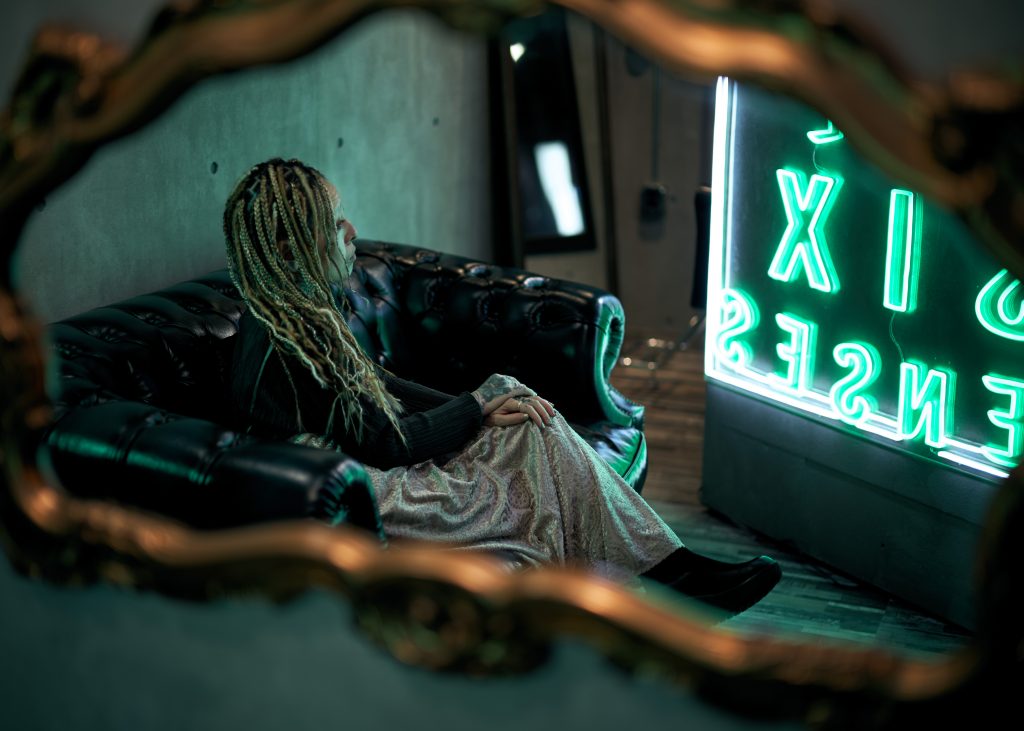 work by YUKKE
work by YUKKE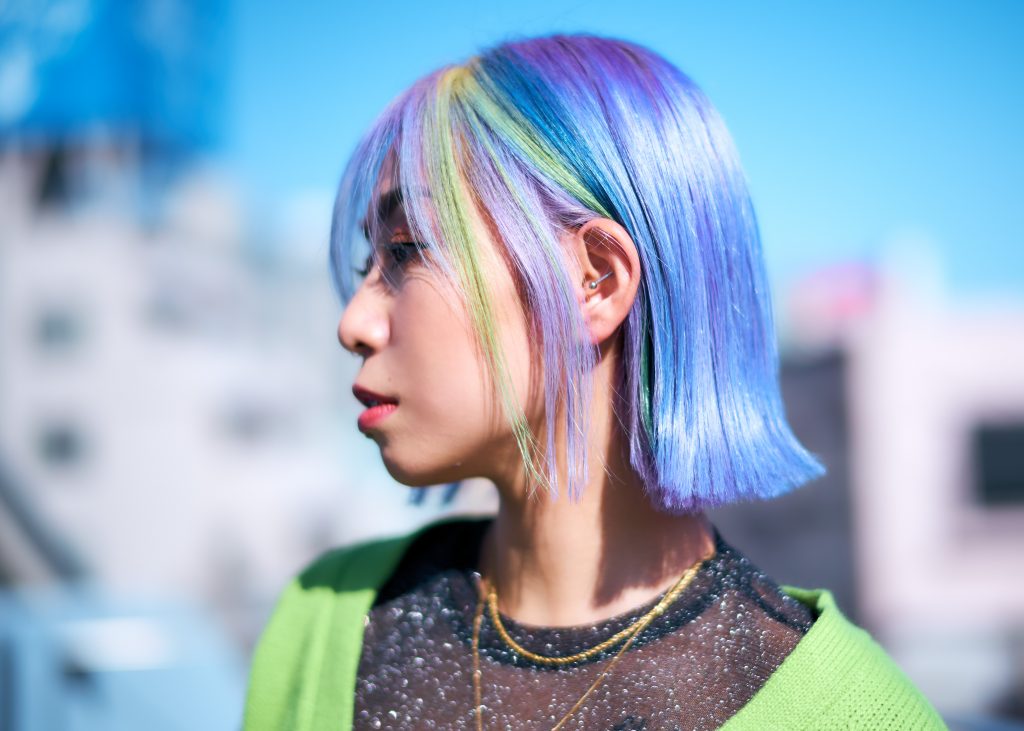 work by RYOSUKE
work by RYOSUKE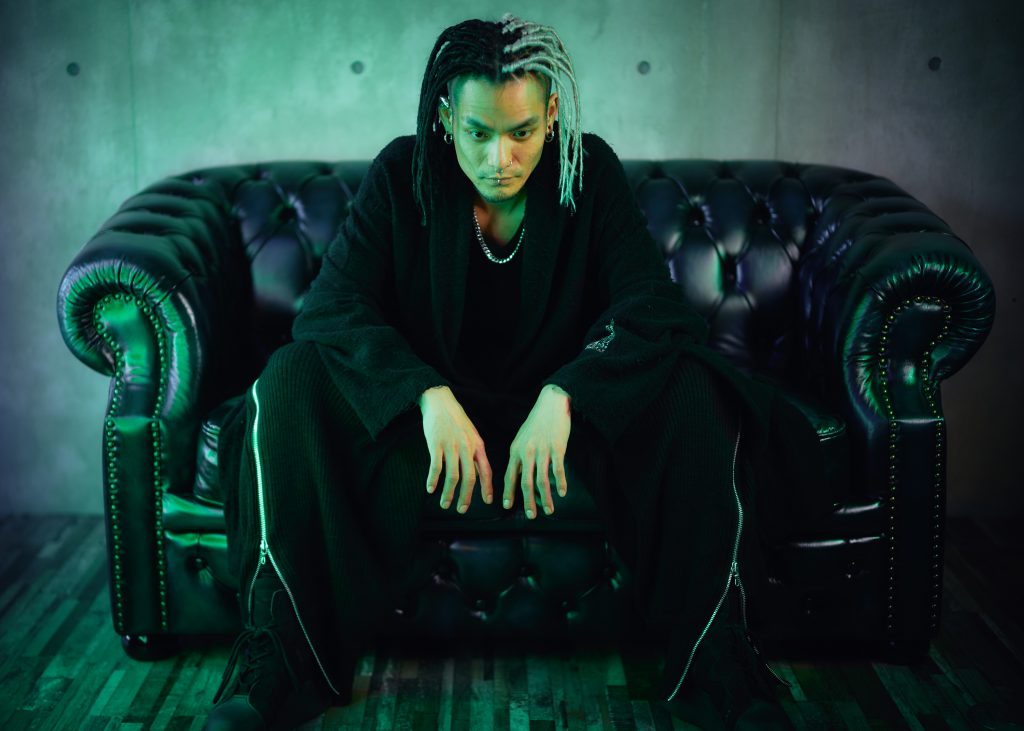 work by YUKKE
work by YUKKE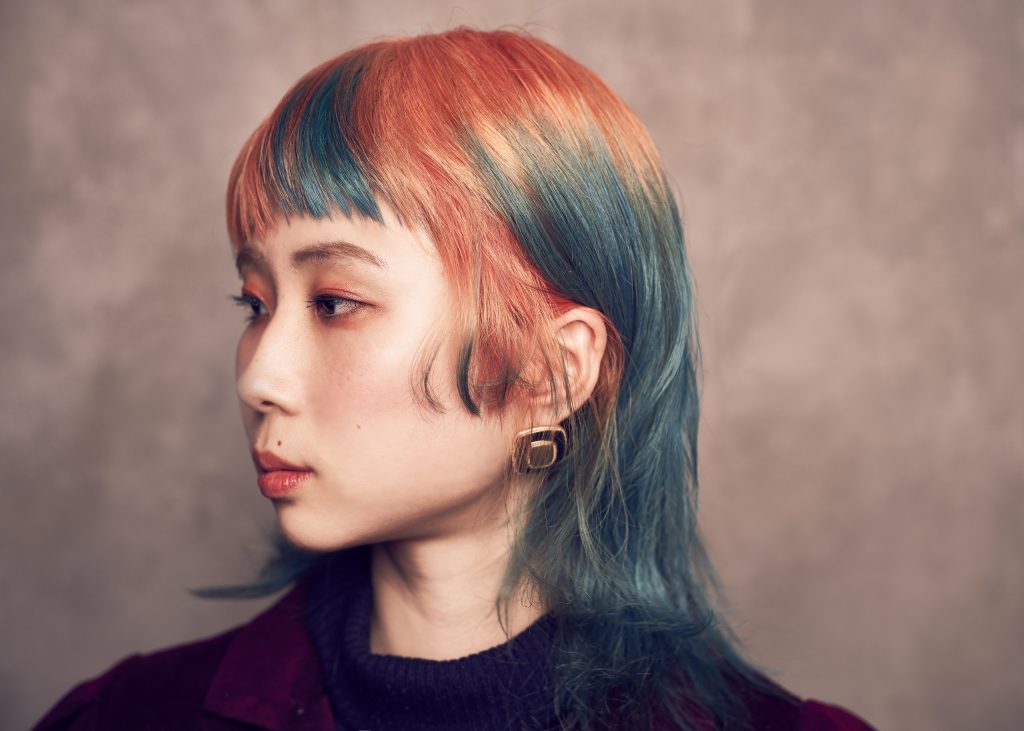 work by RYOSUKE
work by RYOSUKE
